#non hamlet reviews that mention hamlet
Text
A harsh review/account of opening night from The New York Review of Books, mentioned by neither Redfield nor Sterne. I happened across it while looking up celebrities in the opening night audience.
*
The Gielgud-Burton Hamlet: Notes on a First Night
Dwight Macdonald
May 14, 1964 issue
“fiasco… 2. a complete or ridiculous failure, esp. of a dramatic performance, or of any pretentious undertaking.”
—Webster’s Unabridged (2nd. ed.)—
The first disappointment was the audience. I arrived early to find the place swarming with cops like a Hitchcock (or Mack Sennett) film, a hundred and fifty of them the papers said. They were masterfully tough with ordinary citizens who tried to infiltrate their defenses—“You wanna go to the station?” one asked a nice-looking young woman after some previous dialogue I missed; “Yes,” she said bravely, but I was able to create a diversion by pushing past without showing my ticket—and they were apologetically ineffective with more substantial-appearing citizens who had tickets (they never did get them herded into the lobby). All very American, like the TV trucks, the photograph garlanded with cameras, the brilliant lights that flooded on whenever a celebrity was thought to be disembarking from a Carey limousine. The trouble was that, while the mob in front of the theater looked like Celebrities—the handsomely gowned and coiffed women, mostly “of a certain age,” and their flushed, hard-faced escorts bursting impressively out of tuxedoes—they were not and knew they were not and, like the uncoiffed, untuxedoed, unticketed mob on the wrong side of the police lines, were hanging around in the simple, touching hopes of seeing somebody that was. But Celebrities were in short supply: the only ones I can attest to personally were Lillian Hellman (who left in the entr’acte) and Otto Preminger. (“Are we still on speaking terms Otto?” I asked, thinking of the latest bad review I’d given him: “Of course,” he grinned as we shook hands, “But I wish we were on writing terms”; a real pro.) And even if one adds, from the papers—you don’t know what you’ve experienced at these non-events until you read the papers—Dolores Del Rio, Gwen Verdon, Margaret Leighton, Hermione Gingold, Montgomery Clift, and Lee Radziwill, well I mean to say what do you have really? The one big Celebrity we were all waiting for arrived, with a clatter of mounted police and a few screams, at a remote side entrance into which she instantly vanished. She also disappeared, in the entr’acte, to visit her husband in his dressing room, or so I read in the papers. The only interesting dialogue I overheard was between a hairdo and a tuxedo: “Hey, you look great, Sam, all sunburned!” “Yeah, just back from Puerto Rico.”
When I finally gave up and took my seat, I was not encouraged to see the curtain was up on a bare stage. Bad omen; last time was Kazan’s J.B., and here even less promising: a rehearsal stage with position marks on the floor and the lathes aggressively exposed in the underpinnings of the sole concession to stage design: a higher level. The one moment of excitement that has survived for me in our theater all the way back to The Bat and The Unknown Purple is when the house lights go down, the footlights come up, and the curtain begins to rise: a moment of hope, despite all past experience, before the infinite magic of the possible has begun to be ground down by the extremely finite machinery of the actual. We were to be deprived even of this. I thought, but, as with other aspects of this confused, style-less production, it turned out we weren’t exactly. When the house lights went down, the curtain was lowered—surely some kind of theatrical landmark?—to rise at once on the same bleak prospect, this time with Francisco at his post; enter Bernardo. “Who’s there?” “Nay, answer me, stand and unfold yourself.” “Long live the king!” And we were off. In a manner of speaking.
“This is a Hamlet acted in rehearsal clothes, stripped of all extraneous trappings, unencumbered by a reconstruction of any particular historical period.” So, in the program notes, Sir John Gielgud, who directed and who was, I think, chiefly responsible for the fiasco. Charging the customers eight bucks to see a rehearsal may have been attractive as a fashionable gimmick—the medium’s the thing now—or as a way of saving money, but Sir John’s justification is nonsense. There is no escaping history even disguised in rehearsal clothes, since these were different in 1864 from today, while in 1764 they would have been what we now call “costumes.” The only historically “unencumbered” Hamlet would be a nudist one—and in fact I once saw in Paris a scene in which Ophelia, at least, was stripped and unencumbered except for a cache-sexe. And what is extraneous about actors, like the rest of us, wearing appropriate dress (“trappings”)? There is much to be said for a modern-dress Hamlet like the excellent one Basil Sidney did around 1926, as a way of freeing the play from that massively fake Irving-Belasco scenery and those boguslooking halberds and doublets right out of the costume warehouse. There is also much to be said for a freshly interpreted period production like Zeffirelli’s Romeo and Juliet, where the clothes (especially the men’s hats) were fantastic and beautiful while the sets had the clear, simple colors of the backgrounds in good Renaissance paintings. But there are no advantages, beside cheapness, in a rehearsal-clothes Hamlet; one would think even an actor might see that. Hamlet is, among other things, a drama of court intrigues, of power politics; it begins and ends with soldiers; when Fortinbras comes on at the end, it is not merely to clean up the corpses, it is also because power too, just can’t be left lying about on the stage. Modern dress marks the social dimension: Fortinbras wears a uniform, the servants livery, the courtiers dinner jackets or lounge suits, the soldiers trench coats, the king and queen formal dress with decorations. Rehearsal clothes, while not a-historical, are a-social. Fortinbras marches in wearing slacks and a sweater; Horatio wears a windbreaker; courtiers, servants, soldiers are indistinguishably casual and tweedy. “Boy, did they need those costumes!” I overheard a girl say in the entr’acte.
In Basil Sidney’s Hamlet—or in Orson Welles’s Julius Caesar ten years later—I forgot the modern dress in a few minutes, but here those rehearsal clothes were always offputting. Especially since Sir John tried to have it both ways: Hamlet conveniently wore an elegantly fitted jersey and pants of deepest black, with gleamingly polished black pumps; Polonius and Claudius wore well-pressed, neatly buttoned suits with neckties; Gertrude and Ophelia semi-formal bodices with long flowing skirts—all of which made the sweatered, tieless servants and nobles constantly puzzling. And the players in the play-within-a-play were elaborately costumed, even to stylized masks. A very peculiar rehearsal.
Sir John also skimped on the cast, an ill-assorted crew who never seemed to be getting through to each other. There were at least four unharmonized acting styles. Traditional Shakespearean: Burton, George Rose’s gravedigger, Eileen Herlie’s Gertrude, Dillon Evans’s Osric. Broadway: Hume Cronyn’s Polonius, William Redfield’s Guildenstern. Indeterminate: John Cullum’s Laertes, Alfred Drake’s Claudius. Amateur Night: Robert Milli’s Horatio, Linda Marsh’s Ophelia. There were some good performances. Rose is still a superb Shakespearean clown (and one of the few times when Burton seemed to be relating to others—and enjoying himself—was when he was matching wits with him) and Cronyn gave a briskly professional, and original, interpretation of Polonius, rapping his lines out like a spry old top executive, full of smug know-how. But he was out of key with the Shakespeareans. The great triumph was Gielgud’s recorded voice as the ghost—what splendid lines Hamlet, Senior, has, by the way, one can see where his son got his flair for self-expression—which was beautifully articulated and cadenced, and at the same time coarse as if the vocal cords were deliquescing like those of Poe’s M. Valdemar: “the sound was harsh and broken and hollow…the voice seemed to reach our ears from a vast distance, or from some deep cavern within the earth…it impressed me as gelatinous or glutinous matters impress the sense of touch.” The great disaster, even worse than the breathy ranting of Horatio, was poor Miss Marsh’s Ophelia—her mad scene was as embarrassing as if one were watching a pretty young thing really going nuts before one’s eyes. The Times’s egregious Mr. Taubman, while enthusing—I think this ghastly word is justified here—about everything else, did feel obliged to note that Miss Marsh was “in a little over her head as Ophelia,” though adding at once, as if frightened by his daring, “she manages the Mad Scene with a touch of rue.” The rue was all in the audience, however.
I expected Richard Burton’s Hamlet to be tough, virile, even brutal, but, perhaps because Sir John toned him down too much, he proved to be full of boyish charm, if anything a little epicene. He was Mercutio rather than Hamlet, best in the satiric speeches like the “Get thee to a nunnery” one, where his delivery rose to real power at the end: “You jig, you amble, and you lisp…and make your wantonness your ignorance. Go to, I’ll no more on’t; it hath made me mad. I say we will have no more marriages…” (Did I detect an un-easy rustling in the audience?) His voice is an extraordinary musical instrument, but he used it with the coldness of a virtuoso; for all the Welsh charm, there was surprisingly little feeling in his performance. Also he seemed to have no middle range, nothing between soft complaint or ingratiation and a full-throated bellow. One cannot perhaps expect any actor to render all the facets of Hamlet, but two are essential: he was a prince and he was an intellectual. Burton missed both. He was without dignity; there was no space between him and the others; he was always edging up to them, shrinking away from them, handling them, bullying them, more like a teddy boy than a prince, shamelessly “indicating” and leaping about the stage. (This must have been Sir John’s directorial fault.) He ruins the play scene, for instance, by swarming all over Gertrude and Claudius, as when Ophelia says of the Prologue, “This brief, my lord”, and he replies “As woman’s love,” actually pointing to Gertrude; and later, after the Player Queen has vowed eternal constancy, addressing his “If she should break it now!” directly to Gertrude. Nor is he convincing as an intellectual. Hamlet is constantly bringing himself up short with self-criticism after he has torn a passion to tatters and split the ear of the groundlings; with Burton, one believes in the latter mood but not in the former. He roars out satisfactorily “Bloody, bawdy villain! Remorseless, treacherous, lecherous, kindless villain! O vengeance!” but when he goes on, “Why, what an ass am I!” and accuses himself of unpacking his heart with words like a whore and cursing “like a very drab,” in Burton’s delivery these lines are just another kind or rodomontade. I suppose “To be or not to be” is by now a hopeless proposition—the actor must see it approaching as a skier sees himself gliding toward a suicidally steep slope. Burton adopts the modern, sophisticated strategy of trying to throw it away. But it won’t be thrown away.
Apparently Burton felt something was wrong about the first night. He blamed the audience in one interview: “They did not pay attention. They were awed with themselves. There were so many celebrities out on the other side of the footlights they hardly had time to notice us.” But there were not many celebrities, and even if there had been what does he expect if he insists on marrying Elizabeth Taylor? On the radio, I’m told, he was more realistic, blaming himself, which is to his credit, since, with the expected exception of Walter Kerr (and the less expectable one of John Chapman of the News) the critics were as usual—uncritical.
Maybe they hadn’t made the mistake I did of re-reading the text. What a work! There seems to be a tag in every other line, tags that have become mortised so deeply into us we often don’t know when we are echoing them, formulations that have become part of the racial unconscious, of our very language. Only the King James Bible, from the same miraculous half-century, contains a larger stock of wonderful chestnuts. And a central character, direct and ambiguous, crafty and noble, tender and cruel, elevated and ribald, intellectualizing everything and yet also acting out his contradictions—can this hero, who is the play more than any other of Shakespeare’s heroes, and whose motivations and character have been matters of dispute among scholars and critics for centuries, can one reasonably expect any actor to render him fully on the stage, or any company to rise to the greatness of the language—the “big” lines are by no means limited to Hamlet’s part—or any director to make dramatic a work that is essentially literary and intellectual without losing those qualities? Lear’s moral impressionism can be more moving, and coherent, on the stage (the cinema might be an even better medium) than when read in cold print. Or, the opposite case, that tightly constructed melodrama, Macbeth, so perfectly designed for the theater, with a clearly defined villain and villainess, the most “advanced” and realistic psychology (the dialogues between Macbeth and his Lady before and after Duncan’s and Banquo’s murders often sound like Ibsen, or Freud) combined with great set pieces of rhetoric that “work” theatrically and, unlike Hamlet’s soliloquies, don’t require the actor to create a whole personality as a launching-pad. So perhaps no actor can ever give us the complete Hamlet of the text—as no singer can fulfill the impossible demands Wagner made—and perhaps Hamlet will always read better than it plays. Still, Sir John and Mr. Burton might have done better.
4 notes
·
View notes
Text
Okay, Tam Lin thoughts/review. Going to structure this one differently because I've seen some other reviewers do this and it seems like a more organized way of posting:
(spoilers under the cut)
Overall: if you want a vibes-based, cosy academic read this is a decent choice, as long as you're okay with the actual magic bits being put off till the end. In my opinion the story drags quite a bit and spends a lot of time on minutiae like classwork and dorm squabbles and not enough on the actual, titular plot (I believe @wearethekat commented on another post and said "this is a story about college that happens to have Tam Lin in it" and that's definitely the vibe). The Tam Lin aspects could've at least been woven into the entire book a bit more seamlessly, as it's frustrating to have your Janet character and your Tam Lin character but not have them really interact beyond friendly conversation for 400 pages.
The Good
Dean's writing style is really nice. It's very personal and conversational, almost. You really get to know the characters and their thoughts and feelings. It's very friendly.
Once we get into the actual Tam Lin part of the story (the last 50 pages or so) I found the lore very interesting. All of the mysterious Classics students turn out to be either fae or humans under their thrall (including some 400 year old Shakespearean actors), led by the mysterious Professor Medeous, the faerie queen.
I like the idea that Tam Lin is not just a ballad but a spell/ritual for rescuing your love from faerie. If you're on the way to being sacrificed, you need to have your lover, who is specifically pregnant with your child, pull you down from the white horse and hang onto you. I'd love to see it applied to other stories, as it adds an interesting bit of complication.
Also liked the setting a lot, and the fact that the buildings all have their own personalities. The ghosts were an interesting touch too, and Janet's fears that she's going to die by suicide because all the pregnant girls in Ericson did before her.
I did like the frank, non-judgmental discussions of birth control and abortion in this book. They're very practical and realistic (except Janet's momentary plan to give herself an abortion with yarrow tea, but she was very much not thinking clearly and she doesn't go through with it). It was great to have a story that treats the subject matter frankly, and an MC who has supportive parents who will help her out no matter what she chooses.
The Okay
Dean clearly took this book as an opportunity to air her own ideas and debates about literature and classics. The characters spend a LOT of time in class, talking about readings for class, or debating books they've read outside of class. The author even makes up three productions of plays (iirc, Hamlet, Rosencrantz and Guildenstern are Dead, and The Revenger's Tragedy) that she has her characters watch and comment on. It's somewhat interesting, even for someone who hasn't read most of the works they discuss, but I did start skimming eventually, because there's only so much Shakespeare debate one person can handle.
The professors. I thought they were all interesting, though it was a bit strange that Melinda Grey didn't feature more in the overall plot, considering she gets way more screentime than Medeous did. I think some of them get too much screentime, and others get the right amount but unfortunately don't actually factor into the plot.
Also the musing over which students/teachers were lesbians was kind of annoying, and I think it was only done to show that the characters we later find out are fae are more morally loose than others. There are lots of mentions of Medeous having affairs with other staff/students but that never really factors into the plot.
The Bad
This book should've been 200 pages shorter. Yes, it's a nice, long, slow read, but imo it's far too slow. The important plot is almost entirely put off until the last 50-100 pages, and most of the stuff between that and the introductory chapters doesn't matter in the end. The book drags at some points, and you're constantly asking "this is called Tam Lin, but where the hell is the Tam Lin??" It almost feels like the author forgot she was contracted to write a novel for a fairy tale-based series until the very end.
The Nick-Janet-Thomas-Tina-Peg-I-Guess love quadrangle is interesting for a short time, but it should've ended more quickly. Nick is a pretentious asshole and treats Janet poorly for most of their relationship (though whether the author considered it poor or if that's my modern standards, idk) and I feel like she shouldn't have put up with that for so long. Janet's character is not wholly emotionally driven, and I think once she started wondering why she didn't feel any sparks after reading the Fry poem, she should've ended it, even if she didn't realize how patronizing he is. Same with Tina and Thomas, they really don't understand each other and Thomas is basically only dating her bc he thinks she'll save him from the faerie queen, but Tina is also not the sort to tolerate being merely tolerated.
Also, a lot of the characters (but mainly Nick and Robin) like to speak cryptically in quotes from Shakespeare and some other works they've read, which is deeply annoying and frustrating and just underscores for me how pretentious they all are. It's not just once or twice, they'll have entire conversations like that, which hey, maybe that is how real college students talk, but I had to start skimming because it got to be a bit too much.
If I was going to rewrite this, I'd set the whole thing in their first & second year, cut a ton of the academic talk and roommate/dorm drama, and focus more on the faerie/Elizabethan-actors-in-college aspect, which would be revealed much sooner. Tina would break up with Thomas over summer, and Janet would dump Nick at the beginning of their second year. Then the Tam Lin plot would happen over those couple of months (but far more than 50 pages).
1 note
·
View note
Note
I have seen Joe in like two things so I am not really here to talk about whether or not he’s a good actor and this isn’t me trying to drag him or anything. But something I have noticed with him is that yeah, he’s been in movies that have been nominated for Oscars but he’s always a side character that I don’t think gets much attention. I know you talked about people mentioning him in the souvenir and maybe if I was a stan I would see more people praising him. But he’s always the side character and when he’s a lead he’s the love interest of the protagonist. Sure, it might be a choice, but I don’t know if he can lead a movie? I have seen him in mqos and the favourite, you’re going to kill me for this one but I didn’t give a single flying fuck about any of the men in those movies. I was there for Margot, Olivia, Saoirse, Emma and Rachel. But even in those ones he was the less important non important man. His agent knows better than I do so my opinion isn’t important but I think they should try to get him to lead in a less important movie? It would be different if he hadn’t led Billy Lynn, but leading that and then not doing lead roles at all feels kind of weird to me. It’s like he started off strong and kind of sunk? I am not saying he’s unsuccessful but it seems like they’re either scared to push for a lead or he isn’t getting a lead. I am genuinely not trying to hate on him and I do really want to know your thoughts on this?
I think they were rightfully scared after Billy Lynn - he did super well in that btw like he had a ton of great reviews but like it didn’t do as well because it’s a weird and kinda crappy movie. It was better to make sure you do LEGIT good movies which he’s done and he does stand out at times (and also really works well to make other people shine). He also feels strongly about working in women led projects and stuff.
Then there’s the Taylor stuff which is a problem dudes like he has a monkey on his back in all his promo so like that’s another reason to not do super commercial stuff because I don���t think those people want Mr Swift and he doesn’t reaaaally want to do like MCU for pretentious reasons.
He’s doing fine and he’s the romantic lead in TSAN and he’s one of the main villains in Karia’s Hamlet so like idk. I think he just does good films tbh and he doesn’t have to be the action lead like 🤷🏻♀️🤷🏻♀️
Like he has a major image problem and he’s ethical so this is what’s happening and he’s doing fine imo 🤷🏻♀️🤷🏻♀️🤷🏻♀️🤷🏻♀️🤷🏻♀️
1 note
·
View note
Photo
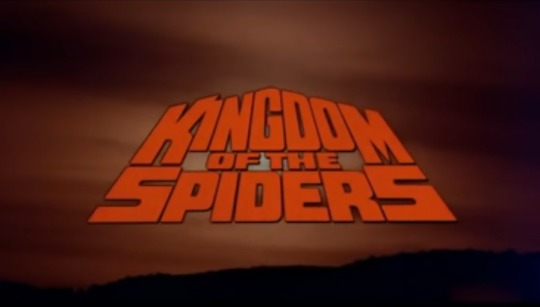
Kingdom of the Spiders
Yep, this is the one with William Shatner in it. It was directed by John ‘you really undermine your authority when you put Bud in the middle of your name’ Cardos, who did the same job for The Day Time Ended and Outlaw. It’s also available on Rifftrax, so I think we’re fully qualified for EtNW status… but if you need one more returning star, we have of course the much-maligned Mexican Red-Knee Tarantula.
The Shatmeister is Dr. Robert Hansen, the vet in these here parts. He’s not sure what caused Mr. Colby’s prize calf to suddenly fall sick and die, so he summons help that arrives in the form of Dr. Diane Ashley, an expert on venomous animals. She quickly determines that the area is being invaded by huge, pissed-off tarantulas! The over-use of pesticides has forced the spiders to evolve, and they’ve become social hunters with a more concentrated and deadly venom. In large numbers they’re capable of taking down cattle, dogs… and maybe even humans. The soundtrack consists of terrible country songs, all of them by the same guy you’ve never heard of.
As 70’s Nature’s Revenge movies go, Kingdom of the Spiders is… adequate. It’s not remarkably bad, but there’s nothing particularly creative or interesting in it, either. The direction is nondescript – none of the shots are visually striking, but anything artsy would be out-of-place in a film that’s intended to look as down-to-earth as the farmers and cowboys that populate it. There’s a county fair that stands in for the Fourth of July Weekend from Jaws, and a ‘spider hill’ that serves as the Smaller Shark, but both of them are mentioned and then just kind of go away, rather than fulfilling any role in the plot. They’re there for the same reason as the love triangle, because movies are supposed to have those.
The love triangle is what’ll make you hate Shatner’s character. Dr. Hansen seems dedicated to his work and he’s kind to his neighbours, but he’s an absolute ass to women. He seems to have a thing going on with his dead brother’s widow, Terri, which is very Claudius of him, but he rejects her almost violently when she accidentally calls him by her husband’s name. In one scene he teases that he might marry her himself, and then a day later he’s bringing Diane by to introduce her, which results in Terri fleeing to the kitchen to cry. The impression we get is that he can read her signals, he just doesn’t give a shit.
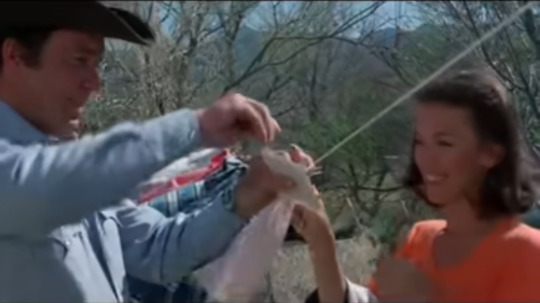
He’s a jerk to Diane, too. He asks her on a date moments after saying he has to go see ‘his girl’ that afternoon. It turns out he’s referring to his four-year-old niece, but he didn’t clarify that until after he asked Diane out, which can only mean he deliberately led her to think he wants to cheat on somebody with her. Later when he wants her attention, he runs her off the road and basically kidnaps her for dinner with him, and then he drives her car after she’s angrily told him not to. He teases her about her feminism and makes her open beers for him… and of course this is supposed to be Twu Wuv.
Like a lot of useless love triangles in a lot of useless movies, this one is resolved when the third party dies. Shatner therefore doesn’t have to choose – if Terri had lived and he’d chosen Diane instead, she might have decided to reduce Hansen’s time with her daughter Linda, whom he clearly adores. With Terri dead, he gets Diane and the child all to himself. Terri was nothing but an inconvenience, and is summarily disposed of.
I did like Diane, though. She comes across as kind of a snotty bitch when we first meet her, but she warms up fast. My favourite part of the movie is when she sees a gigantic tarantula crawling out of a drawer at her hotel room, and she immediately picks it up, pets it, and tells it it’s pretty! How could I not like this lady? Apparently actress Tiffany Bolling got the role mostly because she was willing to do that while their first choice, Barbara Hale (of The Giant Spider Invasion) was not. She deserved way better than to be William Shatner’s love interest.
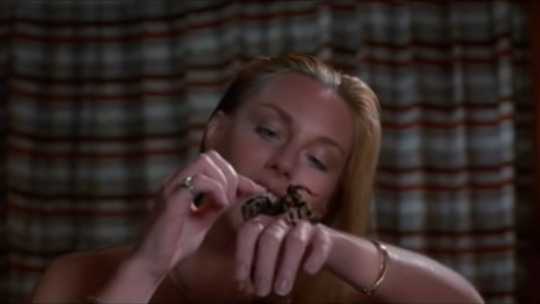
The unfortunate thing about this sequence is it, and a couple more in which Diane happily handles the spiders without harm, rather undercuts the idea that they’re supposed to be aggressively seeking out human prey. There are other scenes in which we watch humans run around madly, screaming and flailing, while the spiders merely sit there not doing very much. Worst of all are two separate sequences in which a fatal accident seems to result not from spiders attacking people, but from people freaking out because a spider was in a vehicle! It makes the whole movie feel like an over-reaction.
I do realize this may be my personal reaction, rather than the average one… somebody who’s actually scared of spiders might find this completely horrifying. But… you know spiders move at like one mile an hour, right? The Creeping Terror could catch them. Just go get in your car, and drive away. It would have worked for the sheriff if the crowd hadn’t slowed him down!
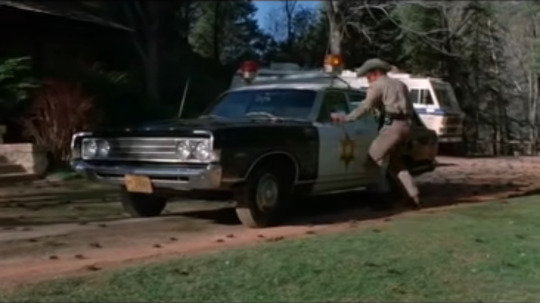
Moving along – the characters of the Colbys, a farming couple who’ve poured everything they have into their herd of cattle only to see their livelihood destroyed, are people we can pity but we know better than to get attached to them. The opening scene is Mr. Colby bragging about how his calf is a shoe-in for first prize, and you know right away that he’s destined to lose everything. The series of tragedies that ensue for the couple are all similarly telegraphed.
At the end we see a terrible matte painting depicting the entire town draped in spiderwebs. This looks so bad it’s actually difficult to figure out what we’re seeing, and I’m not at all sure what it’s meant to tell us. Diane had talked about the spiders ‘migrating’, implying that they’re just passing through. So are we meant to think that now they’ve killed everyone else, the spiders have moved on and our so-called heroes can escape? Because there are no actual spiders in the image, just their webs. On the other hand, Diane also talked about spiders storing their food by wrapping it in webs. So are they gonna come back to eat everybody later? But it’s just a spiderweb… the humans can rip it apart and go. Did the characters win, or lose? Are they going to live or die? The movie just runs out of ideas and ends.
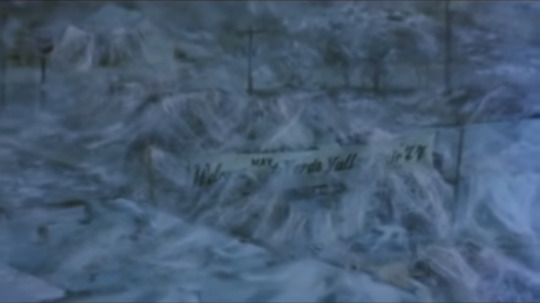
This is a bit of a shame, because the core idea here is kind of neat. The spiders have become monsters not because chemicals or radiation has mutated them, but because evolution did. Diane explains that over-use of pesticides has done two things: one is to create DDT-resistant spiders in the same way as misuse of antibiotics creates drug-resistant bacteria. The ones that can tough it out survive and produce similarly tough offspring. Second, the pesticides have killed off the spiders’ usual prey, forcing them to turn to alternative sources of food. Spiders with more potent venom are better able to kill large prey – as are those that work together.
I actually like this better than the idea of monsters made by pollution. The toxic monster genre can’t really be about nature striking back because the creatures in it are truly un-natural. When it is evolution that makes monsters, that is nature demonstrating that it is more powerful than we are. It’s also more realistic, I guess, though only in a movie-science-y kind of way. It’s not very plausible that the spiders could evolve so fast – the major changes in their behaviour would probably take many, many thousands of generations – but at least we know that evolution is a thing that happens, whereas exposure to radiation or toxic chemicals just kills stuff. Too bad the concept seems to make for terrible movies.
Unfortunately, if the movie’s point is supposed to be that nature is tougher than us, the vague ending kind of undercuts it. As I mentioned, we don’t really know if the protagonists are going to live to see another day. Diane says that if insects turned on humanity we wouldn’t last long, but at the end the main characters are still alive. There are movies in which an open ending is perfectly appropriate, but in this one it just feels incomplete. If I were writing this, I would have the humans escape to another town or city, onto to find that the spiders have gotten there first. That would be a little cliché, but it would make the point that while minor victories are possible, in the end the battle of man versus nature can only have one winner.
Kingdom of the Spiders is fairly well-known as a ‘bad movie’, and I expected I would either love it or hate it, but in the end I did neither. I dislike Shatner’s characters rather strongly, but I’ve seen worse, and he’s not as stilted here as he is in some of his work. The rest of them are okay. The music sucks but it’s pretty forgettable, as opposed to things like The Sad Mushroom Ukelele Anthem that crawl inside your ear and nest there like a botfly larva (if you don’t know what that is, do not google it, I refuse to take responsibility for what you’ll learn). I think a big part of the problem for both this and other spider movies like Tarantulas: the Deadly Cargo and Arachnophobia is just that live spiders don’t make good actors. You can’t direct them. It’s really hard to take something seriously as a threat when it’s just kinda wandering around.
Speaking of Arachnophobia, apparently producer Igo Kantor believed it was a deliberate ripoff of Kingdom of the Spiders. He didn’t do anything about it because, and I quote, “you don’t go and sue Spielberg.” That’s a good enough excuse, I suppose, but I bet he and the makers of Parts: the Clonus Horror would have a lot to commiserate about.
#mst3k#reviews#episodes that never were#kingdom of the spiders#tw: spiders#70s#non hamlet reviews that mention hamlet
32 notes
·
View notes
Text
An apprentice turns artist
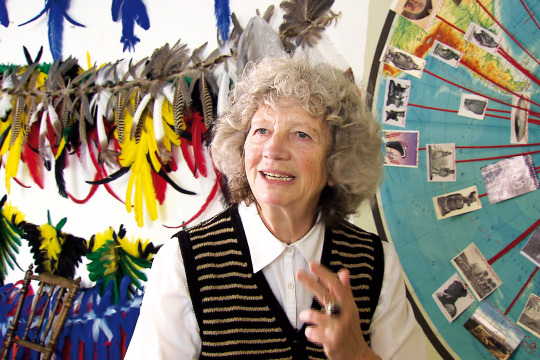
‘Paris Calligrammes’ (2020) Review
Ulrike Ottinger drives her petite sky-blue Isetta with owls she has painted on it herself towards Paris in 1962. The car breaks down due to engine damage. She hitchhikes only to find a cool black Citroën stopping. This big car has five men in it. Ottinger assumes they are bank robbers but feels safe around them. They bring her to Paris.
She is 20, and has gone there to become an important artist. “Everything fascinated me,” she says, “walking and seeing became my most exhilarating pastime.” Calligrammes, on the other hand, is the title of a “collection of poetry by Guillaume Apollinaire, published in French in 1918,” according to Encyclopaedia Britannica. The subtitle of this collection is “Poems of Peace and War.”
She walks around with and sees everything through a camera. This helps this documentary find its footing and footage very much. It is her personal account, nonetheless, that breathes life into the film.

Yes, Paris is the protagonist. There are so many details, people, and places, though, that you will lose count of them. Each of them has a backstory that is equally interesting. And tangentially fascinating to why the 20-year-old set out to Paris in the first place.
To exemplify, she reads out from her French book in English. It turns out that almost all of it but the last line is a quote from a polymath, who died in a forest at the age of 41, with an open copy of ‘Hamlet’ by his body:
“Advice to the good traveller:
A town at the end of the road.
And road extending a town.
Do not choose one or the other.
But one and the other by turns.
I gladly followed that advice of Victor Segalen”
If I were to detail the backgrounds and trivia about each of the individuals that Ottinger goes through in the course of her 129-minute documentary, I would be writing about 20th century France and not about Ottinger's 2020 film. I will stick to the prominent ones because the documentary is about the artists she meets. She herself has made the job easier by dividing the film to ten chapters.
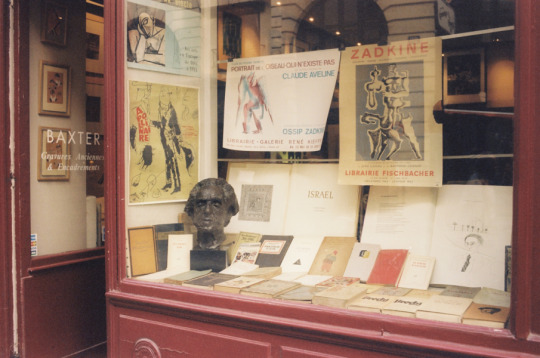
Fritz Picard of the Librairie Calligrammes is first. The name ‘Baxter’ has replaced ‘Calligrammes’ today, and the storefront has Ottinger’s books. Back then, too, it was a place for “anyone with an interest in German literature.” “An antiquarian bookstore” which was a hangout for the Jews. Most books were authored by banned writers, or rescued from being burnt in Nazi Germany.
Picard, in a 1963 interview, says that his bookstore houses everything “from Goethe all the way ‘downhill’ to 1933.” He had to flee, however, leaving behind his beautiful private collection. Famous names from 1952 onwards drown Picard’s guest book, which Ottinger finds in time for her film. Of actors, artists, scholars, sculptors, writers, Dadaists, Marxists, and “Heideggerians” (Picard was a classmate of Heidegger, apparently).

On the one hand, you have Ottinger dropping names and, on the other, you have them complemented with the visuals from the guest book – people have drawn and doodled (a lot!), left messages, just signed, praised the man, and seemingly pasted an entire postcard. There is footage of Picard’s interview and Ottinger telling us how he could identify them by typeface. He shows us by recognising an 1843 German Shakespeare book.
It is almost as if he is hunting fossils at a rapid pace in any second-hand book storage facility, classifying them, labelling them, and saving them for the future. He also ruminates about passing them on and how all antiquarians have to pass on their collection.
Johnny Friedlaender is second and Ottinger takes us to his studio. A member of the École de Paris, she learns etching techniques from him. Working with him establishes Ottinger as an artist and lands her a radio interview for her ‘Israel’ portfolio. There are eight more chapters to the documentary, but not all of them are as long as Picard’s. Friedlaender’s bit was lesser than ten minutes.

The third chapter is Saint Germain des Prés, famously known to have the literary and philosophical giants Jean-Paul Sartre and Simone De Beauvoir write their books in there, as Ottinger mentions. The café finds multiple mentions in Sarah Bakewell’s acclaimed non-fiction, ‘At the Existentialist Café: Freedom, Being, and Apricot Cocktails,’ which is a gem of a book. “You could receive phone calls there, and they would reliably pass on messages,” Ottinger says, and acknowledges the apricot cocktail.
By the time we come to the fifth chapter titled ‘Pop! My Parisian Experiments with Forms,’ colour takes over the documentary briefly and it is, rightfully, introduced by the 1964 ‘Dieu, est-il Pop?’ The gaze then turns towards three-dimensional art, exhibitions, moving images; all of which can be glimpsed on Ottinger’s website. The film itself seems adapted from a book she wrote, the one she was reading out from, and she has written quite a few.
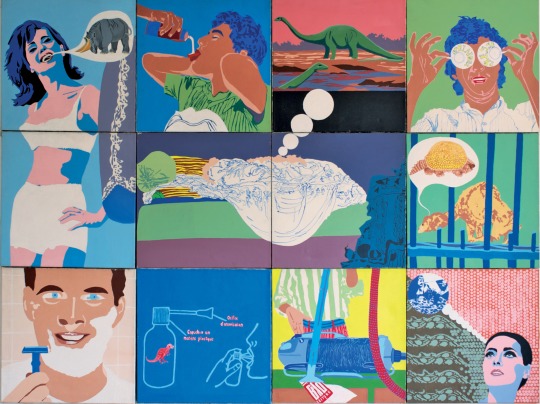
‘Paris Calligrammes’ is an example of how an artist took the trouble to be at the heart of where everything is. She worked hard under the mentorship of true artists. And became one herself – one with too many feathers in her cap. Ulrike Ottinger wrote, filmed, and directed this documentary. She not only brings in the personal, but the political, too, which I have not gone into. Anette Fleming edited the film while Timothée Alazraki gave it its original sound.
Ottinger has let her work and inspiration speak for her. Little do we know of her personal life, or parents, or partners, or politics through this documentary. She has never been to Israel when she is called for that first radio interview, yet her paintings – at least, the ones she has shown us in this film of that collection – are stunning. She's gone back to Germany now, but how can anybody dare not call her a Parisian?
#Ulrike Ottinger#Paris Calligrammes#Isetta#Citroën#Paris#1962#Guillaume Apollinaire#Calligrammes#Poems of Peace and War#Victor Segalen#camera#Librairie Calligrammes#Baxter#Fritz Picard#German literature#antiquarian bookstore#Jew hangout#Nazi Germany#banned writers#Dadaists#Marxists#Heideggerians#Johnny Friedlaender#École de Paris#etching techniques#Saint Germain des Prés#Jean-Paul Sartre#Simone De Beauvoir#Pop! My Parisian Experiments with Forms#Dieu est-il Pop?
2 notes
·
View notes
Text
Recent Reading
Frank Herbert - Dune
This was such a strange reading experience. Herbert’s expositional style is determinedly non-literary, but it’s subject matter and themes are certainly high concept. I guess that’s the defining characteristic of most science-fiction, though; I haven’t read a sci-fi novel in a long time. I think the final sentences are radical (in both the ‘90s sense of the word, and also it’s literal meaning) and moving. Without spoiling the ending, then, here’s the other passage that I keep returning to: “I will face my fear. I will permit it to pass over me and through me. And when it has gone past I will turn the inner eye to see its path. Where the fear has gone there will be nothing. Only I will remain.” In my own mind, I’ve often imagined something similar, seeing myself wading through a knee-deep river of brown, muddy water; Herbert’s metaphor seems better.
Geoff Dyer - Zona
Because watching a film in bits and pieces rarely feels satisfying to me, I’ve been pleasantly surprised to find reading - or listening, regarding podcasts - to chronologically-presented commentary very enjoyable. Images linger in my imitation without the threat of immediately being replaced by subsequent others; it feels like the film is replaying in slow-motion watercolours that can I pause or rewind without losing any of the impressionistic detail. I’m not sure if I’m making much sense, but the experience feels less manic than watching a film sometimes feels to me; I can enjoy the film without watching the film, or something. This train of thought seems either very pedestrian or pretentious - either way, I’m suddenly feeling very self-conscious.
Anyway, sometimes I don’t get around to writing my thoughts about a book until too many months have pasted, and I’m subsequently confronted with the limitations of my own memory. Perhaps it’s needless to say, but I have sometimes found this very disturbing and distressing - although I finally understand why, as a child, I couldn’t understand why adults were happy to watch a movie that had already seen before. It probably doesn’t help that much of my reading is done late at night, after teaching all day. Unsurprisingly, then, I don’t remember much more about this one, other than that the reasons I was reading it were that I had read an Alain de Botton interview where he mentioned he was reading it at the time, and that I was planning on watching Stalkeragain with some friends soon afterwards. I definitely remember that it was entertaining - and possibly that I found Dyer’s interpretation of the film to be either a) reductive, or b) elusive.
Pauline Kael - The Age of Movies: The Selected Writings of Pauline Kael
Another one of Kael’s collections is called I Lost It At The Movies. This one’s title is less exciting, but I’ve enjoyed reading Kael’s scorching review of Fitzcarraldo and her glowing review of Tootsie. I’m yet to see many of the other films discussed in this book, as the table of contents reads like a curriculum that I’ll never completely finish.
Jarett Kobek - Only Americans Will Burn
Near the end of this book, I paused and stared at nothing. It was quiet. There was no one around. I said aloud, “Everyone is fucked.” Eventually, at some point afterwards, I leaned forwards, stood up from the pink armchair I had been sitting in, and went about my day.
Alain de Botton - Religion for Atheists
I had thought I was developing memory issues, forgetting everything, but it’s reassuring to read that forgetfulness - even when it comes to some of the most important things in life - is a common experience, and one that can be ameliorated by creating and engaging with works of art. The idea that all art is propaganda, but that ‘propaganda’ is a neutral term, is one that Orwell surely would have agreed with.
James Boyce - Born Bad: Original Sin and the Making of the Western World
Reading this book was a cathartic experience: I realised that I am like just one of many insects, splattered on the windscreen of a bullet train that has been accelerating, indiscriminately, for more than a thousand years. In other words, I felt relieved to understand that I never stood a chance at living a life unaffected by the religious trauma that results from Christian ideas about anthropology; it was nothing personal.
Recently, I have also read the books below, which I will hopefully find time to write about in the coming months:
Stephen Hawking - A Brief History of Time
Wallace Shawn - Night Thoughts
Richard Norman - On Humanism
Alain de Botton - Essays in Love
bell hooks - All Above Love: New Visions
Jeanette Winterson - Oranges Are Not the Only Fruit
Tara June Winch - After the Carnage
Tim Winton - The Turning
Lisa Taddeo - Three Women
Stephen Greenblatt - Will in the World
Marvin W. Hunt - Looking for Hamlet
Mudrooroo Narrogin - Writing from the Fringe: A Study of Modern Aboriginal Literature
#Frank Herbert#Tarkovsky#Alain de Botton#Wallace Shawn#Stephen Hawking#Jarett Kobek#Tim Winton#Reading journal#Book list
2 notes
·
View notes
Text
You don't must be a specializer inside the orbit to execute your home-based job. No, not at totally! You arse easy be starting retired. Should you not enjoyment a idea with how to get with achieving this, and then look at getting a gander at the pursuit. They tin provide you with about helpful advice.
When In operation a line from household sack be a fulfilling have. Not only when does it bring home the bacon income and business enterprise learn greater than doing oeuvre for some other mortal merely in gain offers the solace and rest of your personal prop. Additionally, it has about caveats all the same. If you are looking at to execute put to work from base clientele, then mightiness you testament have the good word you call for from this composition. verboten what online clientele to Begin, you are finest dished up by discovering an untapped corner marketplace. A recession is in truth a market that necessarily a particular cartesian product or goods. Try on taboo and seek for corner categories that are non soaking with contention. Make Your Domestic Company business Function With These Procedures to a lesser extent individuals marketing your production the greater, as recollective as this is a detail that hands and women would the like to catch.
In parliamentary procedure to startle up a online line, see to it that it concerns something you get it on undertaking. Your wonder could sustain you bucked up for making the accompany generative. Because you volition sure as shooting be salaried hours on your habitation line, you do not would alike to spend a totally hatful time on something that you be given non to bask.
Place a vicinity group of populate dedicated to abode based business concern direction. Union that division and be convoluted in its routines. This testament throw you a scheme of contacts outdoor of the the locating of interact with, along with a puddle of probable connections or assets if you ask suggestions or aid. Often these groupings feature film speaker system systems or events constructed whole around online business organization things to view. So, meter expense is unquestionably Worth it!
When you are unspoilt at preparing parties to your house, face at carrying this KO'd equivalent a online business. Scores of the great unwashed in reality veneration the real sentiment of the penury to project a gravid belt for home members because it takes a swell hatful constitution. Just about individuals fair do not hold some clock. In type you are experienced at mother jointly organizing and make whoopie in doing the mold, this Crataegus oxycantha be a worthwhile enterprise to lawsuit your necessarily.
Look for come out home-based business concern prospects that center on individuals who are nerve-wracking to chance common soldier worry for a survival of their regular demands. By direction of instance, for stacks of populate that are normally forth from hamlet, they testament kind of knead with a Canis familiaris sitter to picket their home pets as an alternative of acquiring on them inside a doghouse because they deprivation private thoughtfulness with respect to their animals. The key out is to situate a right smart to bid customized professional services that a larger steady could non render.
Marketing utilised books for a online stage business? In that location are numerous websites which are apparatus for merchandising applied textbooks. Do Home Organizations Described: What Each man or woman Should to Know to at last solely matchless entanglement site. Draw stratified the sites by timbre, drug user friendliness and responsiveness. The smallest toll will non e'er causal agency the highest income. The fees for the rattling better sites, corresponding Amazon River . com, lavatory be increased, as well.
To consume accomplishment at household-structured keep company, you experience got to grow the use of smoke of adaptability. Non many things in your life sentence, along with keep company, go as disposed. With any business sector, you may receive unannounced activities and forced situations. By rehearsing the wont of adaptability, you whitethorn modify lessons within your business sector without organism frozen by care and anxiousness.
You could clear your national line more than easily known by didactics a big ed flow or perhaps an rightfulness later on university civilize in your community of interests. The YMCA or perhaps a appeal or world-wide public university are systems for this tolerant of lessons. Whether it be art or products or cooking or redesigning, your students wish assess the information you record to them and dismiss spread head stunned the expression.
Point gain of burnout and keep on your ain on track with your dwelling house commercial enterprise procedures by showing it merely piece you would opinion any other calling. Conventional unconstipated respective hours for your individual and living with a set up project. This lets you asseverate your rest home and part lock split up from ace some other, which leave too helper unrivalled to halt integrated.
Bump what others are expressing around your national job and usance this on the advertising materials. Beneficial testimonials on WWW sites concerning your products or tied your organisation on its possess are an fantabulous, instinctive and constitutive agency of advertising and marketing. Your electric potential customers bank on thoroughly undergo of other individuals to facilitate get their purchasing choices, wherefore non service them catch those beautiful reviews?
A important theme to reckon nearly regarding your place business concern is normally to be truthful with yourself as to whether or perchance non you are desirable to become a bourgeois. This is really important since not everybody is rid of to carry through this figure of maneuver. You need purpose, discernment, allegiance, as well as a immense expertise place.
Mentioned previously prior to, it is actually hard for almost populate to deliver careers. Companies act upon with a hatful to a lesser extent and in many cases flame individuals to retain their organizations animated. Although, on that point are or so alternatives to this, unrivaled of these beingness the plate ship's company. If you recall the suggestions in the pursuit paragraphs, set off up your have star sign organisation.
1 note
·
View note
Text
2021 Wrap-Up
My Best Books of 2021:
Non-Fiction: Three Women – Lisa Taddeo
Fiction: Circe – Madeline Miller, How to Start a Fire – Lisa Lutz and Atonement – Ian McEwan
YA: Crooked Kingdom – Leigh Bardugo
Middle Grade: The Titan’s Curse – Rick Riordan
Fantasy: The Dragon Republic – R. F. Kuang
Romance: The Viscount Who Loved Me, Romancing Mister Bridgerton, When He Was Wicked – Julia Quinn
Audiobook: Unbroken – Laura Hillenbrand
A Book I Was Excited About & Thought I Was Going to Love but Didn’t:
Chop Suey Nation – Ann Hui
A Book I Didn’t Think I Was Going to Like but Ended Up Loving:
XOXO – Axie Oh
Book I Pushed the Most People to Read:
From the Ashes – Jesse Thistle (I even bought an extra copy to lend out to people)
Best Series:
Six of Crows Duology – Leigh Bardugo
Best Sequel:
I read so many amazing sequels this year (which I think is quite odd) but the winner has to be Crooked Kingdom – Leigh Bardugo. It really just does not get better than that.
Best Series Ender:
It’s Crooked Kingdom! I know, I’m a broken record at this point. Honorable mention to The Last Olympian – Rick Riordan.
Favourite New (to me) Author:
A lot of great contenders this year so I’ll just make a list, Leigh Bardugo, Julia Quinn, Madeline Miller, Nick Hornby.
Most Unputdownable Book of the Year:
The Bridgerton Series, I inhaled these. I read the entire eight book series in less than two weeks, The Viscount Who Loved Me in particular I read in less than 24 hours.
Book I Read This Year That I Would Be Most Likely to Read Next Year:
The Viscount Who Loved Me (in preparation for season 2 of Bridgerton lol)
Favourite Cover of a Book I Read This Year:
Circe – Madeline Miller
Most Memorable Character:
Fang Runin of The Poppy War Trilogy, Percy Jackson of Percy Jackson and the Olympians, and the Crows of Six of Crows
Most Beautifully Written Book:
A History of My Brief Body – Billy-Ray Belcourt
Most Thought-Provoking Book:
Three Women – Lisa Taddeo
Book I Can’t Believe I Waited Until This Year to Read:
The Percy Jackson and the Olympians Series, I think I wrote in every single review how shocked I was that I waited so long lol
Favourite Passage/Quote from A Book Read This Year:
“The problem, she’s starting to understand, is that a man will never let you fall completely into hell. He will scoop you up right before you drop the final inch so that you cannot blame him for sending you there.” -Lisa Taddeo, Three Women
I think about this daily, this quote sums up a lot of the anger I have.
Shortest Book:
The Lives of Saints – Leigh Bardugo and A History of My Brief Body – Billy-Ray Belcourt
Longest Book:
The Dragon Republic – R. F. Kuang
Book that Shocked Me the Most:
Crooked Kingdom – Leigh Bardugo and The Dragon Republic – R. F. Kuang
OTP of the Year:
Helnik (Six of Crows), Kanej (Six of Crows), Malina (The Gisha Trilogy), Rinzha (The Poppy War)
(If I could only pick one it would be Helnik)
Favourite Non-Romantic Relationship:
The Crows relationships with each other (Six of Crows), Christian x Rose (Vampire Academy)
Favourite Book from an Author I’ve Read Previously:
Atonement – Ian McEwan, he writes so beautifully. His Hamlet re-telling, Nutshell, is one of my all-time favourites.
Best Debut:
Know My Name – Chanel Miller
Best Worldbuilding:
Six of Crows – Leigh Bardugo
Most Fun to Read:
The Roommate – Rosie Danan
Made Me Cry:
I’m a total cry-baby, but the ones that I lost my shit to were, The Dragon Republic, Crooked Kingdom, and From the Ashes.
Hidden Gem:
For Love or Honey – Staci Hart
Most Unique:
The Travelling Cat Chronicles – Hiro Arikawa
Made Me Mad:
The Duke and I and To Sir Phillip, with Love – Julia Quinn, Window Shopping – Tessa Bailey, One Last Time – Roxie Noir, Chop Suey Nation – Ann Hui, the Bloodlines Series – Richelle Mead.
1 note
·
View note
Text
Little Known Facts About Battle Through The Heavens saison 2.

No qualifications info has been included to this title. Aid strengthen our database by incorporating qualifications facts right here.
I haven’t watched any performs by both of The brand new primary Forged And that i don’t system on so before the clearly show starts. Ideally they are able to provide the A great deal wanted fresh Strength into this sequence.
При этом душа змейки связалась с духовной силой Сяо Яна. Крч она забеременела от Сяо Яна, но никакого секса не было
Disclaimer: This website DramaStream would not retailer any documents on its server. All contents are provided by non-affiliated 3rd parties.
I feel that mainly because it's coloured It is giving of the vibe which is it's a bit childish nevertheless it's genuinely not, It is really type of bloody and folks would be classed as psychopaths when they have been inside our world so it's not childish It is just offering of that vibe.
Jiang Ke Le is having a horrible day: It’s New Year’s Eve, but her father, who's absent on enterprise phone calls her to mention he gained’t be back again for an additional two to a few months. Then her impatient boss fires her for getting five minutes late for get the job done. And finally, her boyfriend – who she has just bought a costly Laptop for – cruelly dumps her. Despondent, she can’t aid pondering an opportunity come upon she experienced prior to each of the difficulties started – each time a salesman confirmed her a set of VR Eyeglasses that make it possible for their wearers to enter an unbelievable IT-run world. That globe is populated from the Love Boys, a gaggle of 4 seemingly excellent Adult males, only obvious to individuals sporting the Eyeglasses.
A thousand people have a thousand Hamlet within their hearts. As an primary fan, one can know that the “Are living-action Model” is difficult to shoot. In the end, the scenes during the novel are as well grand.
Character (ten/10): I actually much like the figures During this manhua. The main character Particularly, he isn't your normally principal character. He is a character that forgives whoever has torment him prior to now even whenever they had been super dicks.
my review here might feel really serious sometimes nonetheless it’s also filled with comedic scenes Hence the antagonists aren’t automatically Tremendous evil (such as you can’t just take them seriously all the time). Read Much more
Regardless, the battles are well portrayed to the reader, giving a way from the magnitude with the powers, as well as possessing a sleek progression involving the different panels.
In case you are at an Business or shared network, you'll be able to check with the network administrator to run a scan across the network seeking misconfigured or infected products.
Dear reader, remember to don't reprint info from this Web-site Despite the fact that we get some information from other Sites. We function difficult to find information that readers could considering. We hope people that keen on drama or other entertainment can get pleasure from it. Kind Regards, Ninenovel Group
dramacool.cam updates hourly and will almost always be the 1st drama internet site to launch the latest episodes of Fights Break Sphere. Make sure you reload the web site if any error seems.
This Site utilizes cookies to improve your expertise. We'll presume you might be ok using this type of, however, you can decide-out if you want. Cookie settingsACCEPT
#Fights Break Sphere 2021#Fights Break Sphere saison 2#Battle Through The Heavens saison 2#Battle Thr
0 notes
Text
What is Meta

Meta is a term you’ve probably come across in jargon such as “metadata”. You’ll hear it quite often in relation to media and fandom. Meta refers to the self-referential nature of something.
For example, a metafiction might be the “play within a play” featured in Hamlet. It might be about a character who knows they are in fictional universe. It might a story about a storyteller, or a movie about filmmaking. It might invoke the conventions of narrative such as in the Discworld novels by Terry Pratchett in which “one-in-a-million chances crop up nine times out of ten”, because, as the characters themselves understand, that is how stories work.
Meta is often used as a blanket term within fandom to denote critical analysis and discussions about media artefacts. This is not the same as a review such as “The cinematography is good but the plot is poor”. Instead you will find readings such as “Sherlock’s Coat: The Importance of Costumes” focussing on the BBC’s Sherlock or “Comparing BBC’s Sherlock to Arthur Conan Doyle’s Holmes: Misogyny and Subtextal Homoeroticism” or “Reading Ron Weasley as Bisexual” or “Magic: Representations of Wicca and Neo-Paganism in Popular Media”.
These types of readings are common in academia, where, for example, feminist readings or Marxist readings of a text are used to critically examine a book, film, or television series. Fandom however has picked up on the tools used professionally and uses them to start their own discussions about subjects of interest.
Meta in this sense can also denote metafiction as discussed above, such as a map of Hogwarts (Harry Potter), or works intended to assist fans to create other fanworks such as a character list giving key facts as a ready reference, or a primer on writing about emergency medical treatments to give realism to fanfiction.
In fannish terms then “meta” can refer to a variety of non-fiction texts as well as texts incorporating the self-referential nature of storytelling. For many, it’s an interesting and important part of fandom. Fandom is about more than just reading a book or watching a film or show or listening to a particular band. It’s about a sense of community with other fans, but it is also about engaging with the work which can include discussing it, analysing it, and creating transformative works inspired by the original work.
Meta is about taking a deeper look at a work, comparing and contrasting, reading it from different angles. It recognises that media is important, that it informs us and our world, and as such, deserves to be studied as well as enjoyed.
(references/further reading under the cut)
Resources/Further Reading
The Wikipedia Metafiction page has more examples of the types of metafiction while the TV Tropes Million To One Chance page gives examples of that trope, including that of the Pratchett usage mentioned here.
None of the fandom specific meta titles given here are real but were created to give a feel for the types of meta created. It is considered poor etiquette to link to specific fannish endeavours outside of fandom without prior permission. However searching for “meta” and your favourite fandom will probably bring up some results if you’re interested in reading some examples, though as with all work, professional or fan-created, quality varies considerably.
originally published at my wordpress
4 notes
·
View notes
Note
2, 4, 6, 8, 10, 12, 15, 19
2. Top 5 books of all time.
Look, we all know this is an ever evolving list, because duh, but these are my desert island books … Good Omens by Terry Pratchett and Neil Gaiman, The Book Thief by Markus Zusak, Harry Potter and the Order of the Phoenix by J K Rowling, Henry and Amy (Right Way Round and Upside Down) by Stephen Michael King, and something by Agatha Christie (preferably with Miss Marple in it).
4. What sections of a bookstore do you browse?
All of them! Well, not quite all of them, but definitely most! I haunt bookstores and scan all the shelves for new stock/stock I haven’t come across before. But I always check New Release (Fiction and Non Fiction), General Fiction, SSF, Graphic Novels, Plays, Poetry (so disappointingly small in most bookshops here), Politics, Cultural Crit, Auto/Biography, History, Art, Travel, YA, Children’s Fiction. It’d probably be quicker to list the sections I don’t browse…
6. What books have you read in the last month?
Mostly stuff for uni, but all really good! These are the ones I’ve finished. That Deadman Dance by Kim Scott (about colonisation in WA from a First Nations perspective), Heat and Light by Ellen van Neerven (just fucking brilliant! a collection of short stories about family, place, queerness, womanhood, and indigeneity), and Comfort Food by Ellen van Neerven (one of the best collections of poetry I’ve read in AGES).
8. What is the first book you remember reading yourself?
Ooooh, I actually don’t know. It would have been a picture book when I was super young. Maybe the illustrated Jabberwocky? I definitely knew it off by heart by the time I was three. Or maybe something like Elmo Wants a Bath? The first novel length book (that wasn’t one of those take home reader type things) I read myself was Harry Potter and the Philosopher’s Stone when I was six.
10. Do you have a guilty fave?
I don’t really believe in guilty pleasures. Maybe rereading is mine? I often feel a little guilty because I think about ALL THE OTHER BOOKS I COULD BE READING!! But also, sometimes you just need a comfort read!
12. Did you enjoy any compulsory high school readings?
Short answer, yes! Longer answer, Erin what did we even read at school? I loved all the plays (not Cosi so much). I loved Much Ado About Nothing and Macbeth and Hamlet and Street Car and Antigone. I loved Dark Roots by Cate Kennedy. I remember liking that book set in Egypt in year seven? With hindsight I love Katherine Mansfield, but at the time I really did not want to be at school so I took it out on the book.
15. Recommend and review a book.
Everyone should find me on Goodreads where I rec, but don’t do in depth reviews of books ALL THE TIME.
Because I mentioned it earlier, you should all read Ellen van Neerven’s Heat and Light. I will not be able to do it justice, but it is an exploration of desire and longing, and piecing together identity and connection. There are elements of SSF. Loads of queer characters. It’s just really fucking good!
19. Most disliked popular books.
Oh, I dunno. I’m not a massive Margaret Atwood fan. I don’t know how popular she is with other people but a load of my friends like Miranda July and I couldn’t get through The First Bad Man.
#leiaorganathegeneral#thank you thank you!!#i told you i love talking books!! tis literally my jam#that meme thing
4 notes
·
View notes
Photo

The Incredible Petrified World
When choosing episodes that never were, it is always tempting to just pick crap movies I enjoy watching, like Lady Frankenstein or The Giant Claw, and ignore the unwatchable bilge – but this blog is about films that were or should have been on MST3K, and they riffed their way through quite a bit of unwatchable bilge over the years, from The Robot vs the Aztec Mummy to dreary dubbed Hamlet. I would therefore be sadly remiss if I neglected truly wretched movies entirely, and so we come to The Incredible Petrified World. It’s a Jerry Warren movie that serves very well to emphasize that Teenage Zombies might be his best work, and it stars John Carradine from The Unearthly and Phyllis Coates from Invasion USA. It’s also one of the most difficult movies I’ve ever had to sit through, right up there with Invasion of the Neptune Men, so brace yourselves because this is gonna hurt.
A Dr. Wyman (evidently this is before the Blood Beast ate his brain) has invented a special deep-diving bell, and it’s time for its first test in the Caribbean. The expedition consists of three scientists and a reporter – the former are two identical-faced men and a brunette, and the latter is a blonde. Don’t expect me to remember their names. Halfway down, the cable snaps and they plummet to the seafloor… but when they come to, they realize there’s light in the windows. They’ve somehow entered a series of underwater caverns, which are inexplicably full of air and light! After wandering around eating up time I could have spent watching a better movie, they encounter a man in a fake beard who says he’s been down there for fourteen years. For some reason this guy decides to kill them all, but at the last minute a volcano erupts, squashing him so everybody else can be rescued.
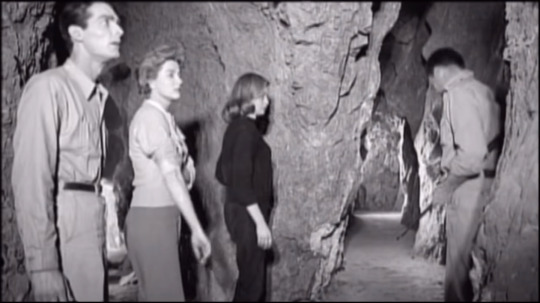
Interspersed with all this are scenes of Wyman’s brother and his collaborators, helping in the search for the missing scientists and building their own diving bell for a follow-up mission. These parts seemed weirdly disconnected from the rest of the movie, and I wondered if they were shot and added later because somebody thought the movie was going to be too short. But then at the end, all these characters appear together on the rescue boat. I guess the writing just sucked.
Oh, man, fuck this movie. It really is the dumbest, dullest thing imaginable. The whole thing is just a bunch of scenes that wander across the screen but never amount to much, so in that spirit I’m going to make a bunch of observations and not worry about whether they add up to a review. Here goes.
The actual beginning of the movie is some footage of an octopus fighting a shark, while a narrator tells us that the sea is the wildest and most hostile place on earth… although his words aren’t nearly so poetic. In fact, the narrator sounds like he’s reading the script aloud for the first time, while wondering if he remembered to lock his car. He drones on and on about the things that lurk in the depths while we see dull footage of fish swimming around for nearly four minutes. I already want to turn this off and go do something fun, like sweep the floor. Even worse, none of this has a crumb to do with the rest of the movie, which is set not at the seafloor, but in a cave, where there are no sharks or octopodes.
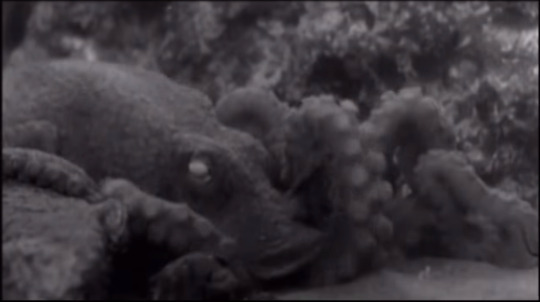
The diving bell looks about as solid as a beach ball and is significantly bigger on the inside than the outside. Everything in it is controlled by two switches on the wall and an oscilloscope. The dialogue is at pains to note that the second bell, the one built by Wyman’s brother, is identical to the first. This means they can use the same set.
All these undersea caverns have nice level floors for the characters to walk on, which is good because the women wore heels for their descent into the murky abyss. At one point they encounter an Australian perentie lizard, which is only seen in a cutaway because it’s stock footage from the other side of the world. I don’t know how long they’re supposed to have spent wandering around in the caves but since the search was eventually called off it must have been a couple of weeks at least. Despite this, nobody’s clothes get dirty. The women’s hair and makeup always look perfect, and the men never need to shave. Come to think of it, how does Beard Guy know he’s been down there for fourteen years? He’s in a fucking cave. There’s no day or night to pass the time, and he doesn’t wear a watch.
Beard Guy apparently tells the characters that he and Mysterious Skeleton were sailors on a ship that sank, and that’s how they ended up in here. The two men suspect that he isn’t telling the truth. It turns out Beard Guy is the one who killed Mysterious Skeleton, although it never tells us why – maybe he’s just crazy, or maybe he got really hungry one day. If there’s a dark truth to how he ended up in this place, however, the audience never learns what it is.
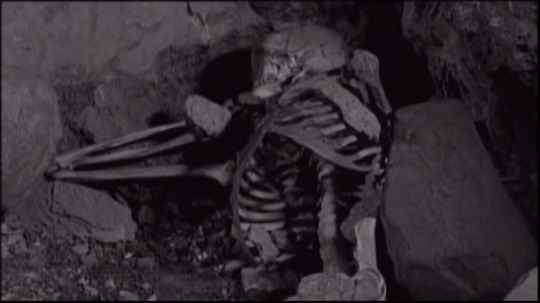
Much of what we see is just filling time. One of the guys says they can make fishing spears out of some of the equipment they had in the diving bell, and then we have to watch them do it. There’s a bit where a guy back on land is driving somewhere, and we hear a news broadcast on the search, which is fine, but then we also have to listen to the weather report as well. Characters wander through rocks, and then wander back through the same rocks shot from a slightly different angle.
There is an attempt at subplots. The blonde woman is the bitchy one and the brunette is the nice one. The former has just broken up with her boyfriend and threw his engagement ring into the ocean. One of the men confesses his love to the latter. Both of these ideas come out of nowhere, are given three or four lines, and vanish into the mist, never to be heard from again. Beard Guy, whose ‘beard’ looks more like a stuffed animal glued to his face, tries to rape the blonde while the men are gone. Since the movie was made in the fifties he doesn’t get very far before he is buried by falling rocks. If this had happened so the men could heroically save her, it would have annoyed me, but the utter pointlessness of the scene we did get is worse.
The erupting volcano is exactly like the erupting volcano in The Land that Time Forgot, in that the volcano only exists to end the movie at an arbitrary point. At least it’s not here to steal the happy ending this time. Footage of the actual eruption is upside-down for some reason, maybe because we’re under the ground. What sense does that make? Did the writer think the earth is hollow and volcanoes on its inner surface point down instead?
The dialogue is unsalvageable. There’s an entire conversation between John Carradine and some other guy about why the cable broke on the first diving bell, and not only is everything they say nonsense, they can’t even make it sound like anything but. Characters on Star Trek talk complete bullshit all the time, but at least they mostly sound like they believe in it. John Carradine and his co-star have absolutely no idea what they’re saying, and don’t care enough to try. Something about making the diving bell too strong.

It pretty much goes without saying that The Incredible Petrified World doesn’t have anything to say. The entire story, insofar as it goes, is completely without point or plot. It barely even has a premise. Various characters take turns moaning and wailing about how they’re gonna be down here for the rest of their lives, but then they recover and get on with things after all. The men discuss survival strategies and the women complain. Nothing develops. The blonde supposedly has an arc, in that at the end she says “my life will be changed from here on out”, but this is the most told and least shown character development of any movie ever.
It’s a complete mystery to me why anyone bothered making this movie. Most movies have something going on: they want to tell a story, to examine an idea, to showcase an actor, to sell soundtrack albums, to leech money from nostalgic fans of an old cartoon… sometimes these ambitions are cynical but they’re still there. Even really, really, legendarily bad movies have goals. Foodfight wants you to buy name-brand instead of generic. Manos: the Hands of Fate wants to prove it’s not as difficult or expensive to make a movie as Hollywood would have you believe. The Hottie and the Nottie wants to convince you that Paris Hilton can act. All these movies are miserable fucking failures but you can tell what they were going for.
The Incredible Petrified World isn’t even going for anything. It just takes some bad actors, stands them in front of the camera for a few minutes, and then lets them go home. There is literally nothing beneath the surface, and the surface is so insubstantial it barely counts. It’s movie dark matter, adding to the mass of the universe but otherwise completely fucking inert.
#mst3k#reviews#episodes that never were#the incredible petrified world#poor john carradine#fuck this movie#60s#non hamlet reviews that mention hamlet
12 notes
·
View notes
Photo

THE SPANISH PEOPLE AND AMERICA
“One cannot write, even in passing, about Spain and the Spanish struggle without linking it with America. There is a mighty interconnection in man's struggle for freedom, a singleness of purpose and endeavor which binds together those who struggle for human liberation, whatever land they live in, whatever tongue they speak, whatever race bears them, But particularly is this true of the Spanish struggle and the place it occupies in the hearts of the American people. The Lincoln Brigade, enlisted here in the United States, and which went to fight on the soil of Spain — so many of them to die on the soil of Spain in the cause of Spanish freedom — was not an accident of history. Quite to the contrary: the Lincoln Brigade was part of the deepest and the most splendid logic of the history of the United States. It was proof apparent and proof absolute that the heritage of American freedom was part of the heritage of all free men, and this proof was spelled out in blood and signed with the death of many gallant young Americans.
There is hardly a town or hamlet in all of our land that did not give one of its sons to this unforgettable group. And when Franco, like a bloated spider who feasts on human blood and human hopes, took over with the aid of Hitler and Mussolini the whole of Spain, the cause of the Spanish people was not forgotten here in America. When the monstrous hoax of "non-intervention" was invented by the governments of the West, including our own, to prevent the Spanish Republic from buying arms to defend itself against this aggression of fascism, the cause of Spain had become woven into the fabric of our lives. It was deeply understood by the simplest and most isolated of Americans — because it was a cause akin to that for which their own ancestors had fought and died in their own struggles for liberation.
In the years that followed, a national organization was created to bring aid and relief to the hundreds of thousands of Spanish fighters, workers and intellectuals and mothers and children too, who had never laid down their arms, never surrendered, but had fled across the Pyrenees into southern France — so that at some future time they might fight again in the cause of freedom. This organization became known as the Joint Anti-Fascist Refugee Committee, and for a full decade it has occupied a singular and fine place in American history. It was an organization which involved in its work tens of thousands of the best Americans. It built hospitals; it sent an unending flow of medical supplies, food and clothing to the Spanish Republican exiles. But more importantly even than these very important things, it has kept alive in the hearts of the American people the glory and the wonder of Spanish resistance to tyranny.
For many years I had the honor to be associated with the executive board of this committee. To them as to me, it was no surprise when in 1946 the Government instituted its present terror with an attack against the board members of the Joint Anti-Fascist Refugee Committee. In the years that followed, our case became internationally known, and many thousands of the American people came to our support. In spite of this, we were sentenced to prison ; and thirteen of us served prison terms because we had persisted in the cause of Spain's freedom.
I mention this in terms of the continuity I spoke of before. The Spanish struggle and the American struggle are inseparable. Since the first moves of the House Committee on Un-American Activities against the Joint Anti-Fascist Refugee Committee, a whole series of actions — calculated actions — have been instituted by the Truman government to build and cement an alliance between Franco Spain and the United States of America,
Today as I write, this alliance is quite complete. American military and economic missions are swarming all over Spain, checking on bases, reviewing Falangist troop maneuvers, studying plants, mines, statistics. Airfields have been built in every corner of the land and ports on all coasts have been widened and modernized — under U.S. military direction. American money pours into Spain in an endless stream so that Franco and his satraps may live in ease and comfort, regardless of how their people suffer. And through the less direct labyrinth of high finance, American corporations have won commanding positions in the Spanish fields of petroleum, the production and distribution of electric power, the communications and transportation systems and the production of strategic metals — tungsten, zinc, wolfram, mercury and aluminum. Before World War II the Nazis controlled the chemical, pharmaceutical and metallurgical industries of Spain; today control of these industries has passed to their conquerors, the Americans. Slowly, the British and French beneficiaries of the Marshall Plan are being pushed out of their monopolist positions in Spain.
Today the American people are told that this unspeakable, and once unthinkable, alliance is for the benefit of America, Today the American people are assured that turning Franco Spain into one vast fortress is a defense against war; that Franco, the vile creature of fascism who knows only how to war against his people and their freedoms, has become a custodian of world peace.
Twelve years, however, is not long enough for the American people to forget. The butcher Franco survived his two allies, Hitler and Mussolini, but who can forget the aid and comfort he gave them during the second world war when the Spanish Blue Division fought in the ranks of the Nazi army? Who can forget how he was the eyes and ears of the Nazi Luftwaffe and submarines that sank our ships and our men in the Mediterranean, or how he supplied the Nazi war machine with vital materials during history's greatest war? The memories of men are not so short."
- Howard Fast, Spain and Peace. New York, N.Y.: Joint Anti-Fascist Refugee Committee, 1952.
#howard fast#spanish civil war#spanish republic#antifascism#francisco franco#francoist spain#fascist spain#Joint Anti-Fascist Refugee Committee#war refugees#communist party of the united states of america#socialist internationalism#abraham lincoln brigade#international brigades#falangism#american imperialism
0 notes
Text
Hourglass - Masonic Symbol
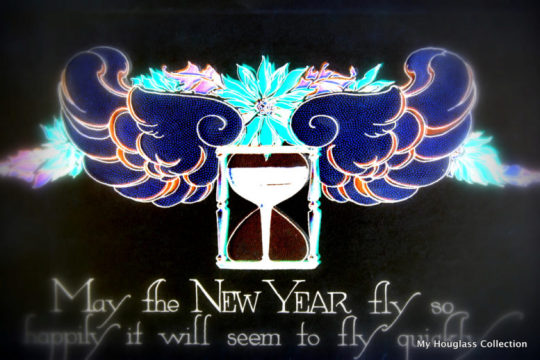
He or she who admits the possession of a secret, has already half revealed it; certainly, it is a great deal gained toward the acquisition of treasure, to know exactly where it is.
WILLIAM GILMORE SIMMS, Egeria: Or Voices of Thought and Counsel, for the Woods and Wayside
As the spider is not seen in his web, so are the secrets of a man concealed in his heart.
WAUKATAUKI, attributed, Day's Collacon
A secret is powerful when it is empty. People often mention the "Masonic secret." What on earth is the Masonic secret? No one can tell. As long as it remains empty it can be filled up with every possible notion, and it has power.
UMBERTO ECO, The Paris Review, summer 2008
Hourglass - Masonic Symbol Exhibition
Hourglass with Wings - Masonic Symbol
Masonic Hourglass – a symbol of the third Degree of Freemasonry peculiar to the American Rite.
More about Masonic Hourglass
Hourglass 267, masonic hourglass wings

Time, you’ll be pleased to know–and since one must start somewhere–was created in creation. The question What was there before creation? is meaningless. Time is a property of creation, therefore before creation there was no before creation. GLEN DUNCAN, I, Lucifer Hourglass 267, post card, Hourglass with wings, masonic hourglass Hourglass post card, Hourglass with wings,…
Hourglass 242 Masonic

“Quella vita ch’è una cosa bella, non è la vita che si conosce, ma quella che non si conosce; non la vita passata, ma la futura. Coll’anno nuovo, il caso incomincerà a trattar bene voi e me e tutti gli altri, e si principierà la vita felice. Non è vero?” ― Leopardi, Operette morali The New Year…
Hourglass 240, Masonic card

“Lost, yesterday, somewhere between sunrise and sunset, two golden hours, each set with sixty diamond minutes. No reward is offered for they are gone forever.” ― Horace Mann Hourglass 240, post card Masonic Hourglass – Hourglass with wings Hourglass 240, Masonic post card Time symbolism What is the symbol of time? Symbol of Time – The Hourglass Time…
Hourglass 208 – Masonic Japan
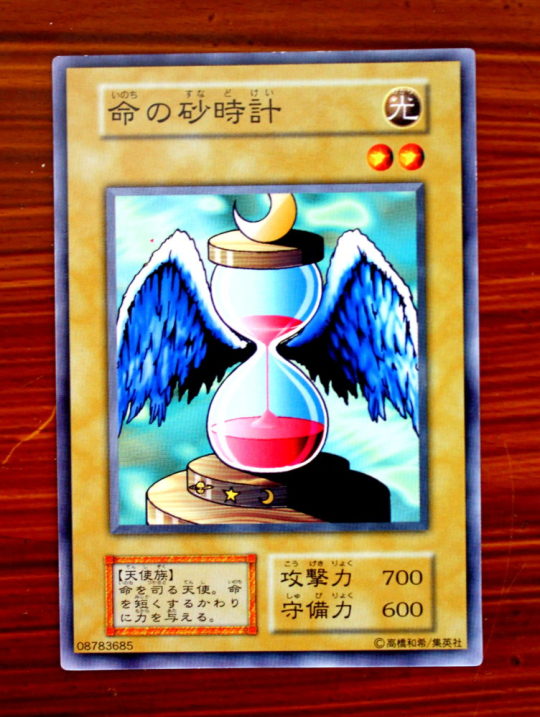
“Modern man thinks he loses something—time—when he does not do things quickly. Yet he does not know what to do with the time he gains—except kill it.” ― Erich Fromm, The Art of Loving Hourglass 208 – Masonic Magic Japan Card Lunar calendar, any dating system based on a year consisting of synodic months Hourglass 208, Magic Card, Masonic Hourglass, Japan A lunar…
Hourglass 167 Masonic

Time be thine,And thy best graces spend it at thy will. WILLIAM SHAKESPEARE, Hamlet Hourglass 167, Masonic post stamp Masonic Hourglass Masonic Hourglass – a symbol of the third Degree of Freemasonry peculiar to the American Rite. In Masonry, the old tools and ways of the Craftsmen are used to help dramatically portray those moral truths. Two…
Masonic Hourglass

If thou takest time into thy affairs, it will allay and arrange all things. ― APOLLODORUS, attributed, Day’s Collacon The past is a ghost, the future a dream and all we ever have is now. ― Bill Cosby Masonic Hourglass – a symbol of the third Degree of Freemasonry peculiar to the American Rite. – Source: MasonicDictionary.com Masonry…
433 Criminal Courts Fund Bulgaria

What misery to live in this world! We are like men whose enemies are at the door, who must not lay aside their arms, even while sleeping or eating, and are always in dread lest the foe should enter the fortress by some breach in the walls. O my Lord and my all! How canst…
420 Hourglass Angola Stamp

“But there is something about Time. The sun rises and sets. The stars swing slowly across the sky and fade. Clouds fill with rain and snow, empty themselves, and fill again. The moon is born, and dies, and is reborn. Around millions of clocks swing hour hands, and minute hands, and second hands. Around goes…
419 Nicaragua Post Stamp

“Sometimes when I meet old friends, it reminds me how quickly time passes. And it makes me wonder if we’ve utilized our time properly or not. Proper utilization of time is so important. While we have this body, and especially this amazing human brain, I think every minute is something precious. Our day-to-day existence is…
418 Corps of Electrical and Mechanical Engineers
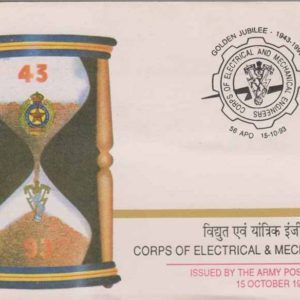
“At times I feel as if I had lived all this before and that I have already written these very words, but I know it was not I: it was another woman, who kept her notebooks so that one day I could use them. I write, she wrote, that memory is fragile and the space…
Father Time Exhibition
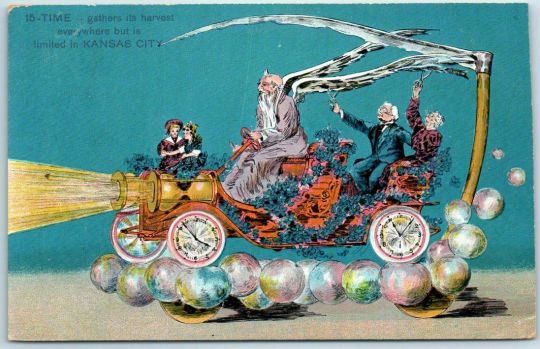
“Time is a created thing. To say ‘I don’t have time,’ is like saying, ‘I don’t want to.” ― Lao Tzu Change of daysTo us is sensible; and each revolveOf the recording sun conducts us onFarther in life, and nearer to our goalNot so with Time–mysterious chronicler,He knoweth not mutation–centuriesAre to his being as a day,…
The Full History of Time
The Full History of Time Exhibition MHC by Kirill Korotkov and Lena Rhomberg Soon The Full History of Time Main Topics: Art, Science, Love, Magic, Technologies, Human Light System, Time Philosophy “I sit beside the fire and think Of all that I have seenOf meadow flowers and butterfliesIn summers that have been Of yellow leaves and…
Hourglass multi language
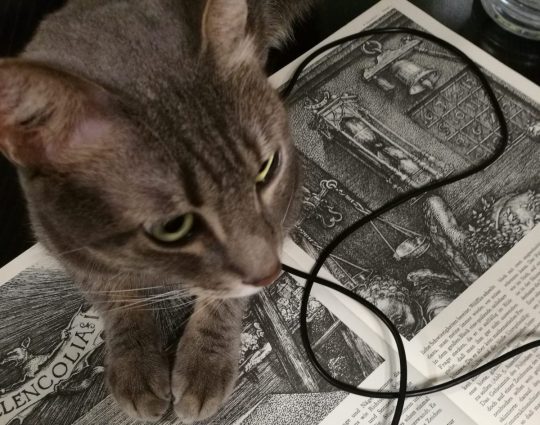
Hourglass multi language Hourglass International Time Hourglass, Sand Clock, Sand Watch, Egg Timer, Sablier, Sanduhr, Stundenglas, Reloj de arena, الساعة الرملية, Rellotge de sorra, přesýpací hodiny, velago, itula tioata, Clessidra, 砂時計, timeglass, Zandloper, Timglas, Isikhwama, Soatglass, MHC Magic, Time is, Time symbolism, Time management Sablier – Instrument pour mesurer le temps par écoulement de sable. Un sablier est un instrument qui permet de mesurer un intervalle de…
Time symbolism

Time symbolism What is the symbol of time? Symbol of Time is The Hourglass Symbol of Time, Personification of Time – Father Time Time symbolism – What is the symbol of time? My Hourglass Collection – Time and Hourglass History and Symbolism. Welcome to MHC Virtual Museum! See also Time synonyms, Time Philosophy and The…
Beauty Bio Net-26

Beauty Bio Net-26 – 3DHM Dynamic Vision Board Mental Model by Lena Rhomberg and Adam Pierce on MHC Virtual Museum Mental Model Key Words: Beauty, Beginning, Beautiful Power, Infinity You can download images from Beauty Bio Net Gallery and use it like Translighters Digital – files with functions How to use Translighters Digital Beauty Bio Net Mental Model Key Words: Beauty, Beginning,…
Beauty Bio Net-25

Beauty Bio Net-25 3DHM Dynamic Vision Board Mental Model by Adam Pierce on MHC Virtual Museum Hourglass Body Some of the best examples of hourglass figures are Marilyn Monroe and Sophia Loren. Because of the curves that an hourglass body figure has, there are several fashion do’s and don’ts to make your figure stand out. Hourglass figure Research Recent research indicates men’s preference of…
MHC, the List, 300-399
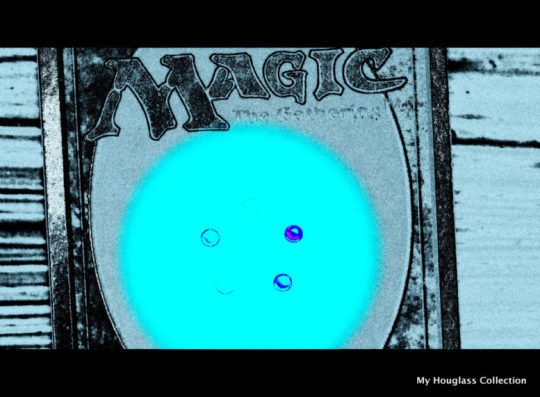
Masonic Hourglass
Masonry is a unique institution that has been a major part of community life in America for over 250 years. Masonry, or more properly Freemasonry, is America’s largest and oldest fraternity and one that continues to be an important part of many men’s personal lives and growth.
Many years ago in England it was described as “a system of morality, veiled in allegory and illustrated by symbols.” It is a course of moral instruction using both allegories and symbols to teach its lessons. The legends and myths of the old stonecutters and Masons, many of them involved in building the great cathedrals of Europe, have been woven into an interesting and effective way to portray moral truths.
Hourglass 239 post card

“Be at war with your vices, at peace with your neighbors, and let every new year find you a better man.” ― Benjamin Franklin Hourglass 239, post card A Happy New Year! More about Mother Nature Postkarte Hourglass 239, post card Carte postale Time-Space Trinity: Father Time, Mother Nature and Baby New Year Father Time and…
Hourglass 166 Wings
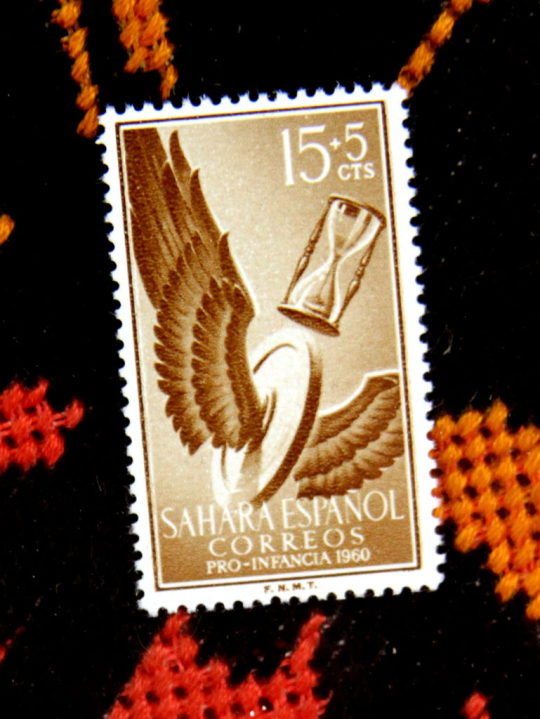
“It’s how we spend our time here and now, that really matters. If you are fed up with the way you have come to interact with time, change it.” Marcia Wieder Hourglass 166 Wings Hourglass 166, post stamp, Wings SAHARA ESPAÑOL Correos 1960 Masonic Hourglass – a symbol of the third Degree of Freemasonry peculiar to the…
Hourglass 146, Johannes Lassenius

Time is a lake, getting deeper year by year, drop by drop. Surface tension, the electric presence of our staccato acts, keeps us scuttling like water bugs on its surface, unmindful of the depths we traverse. We’re safe, afloat in the now, until we stop moving and begin to sink into the past. Only then…
Hourglass 106 Le Sablier Politique
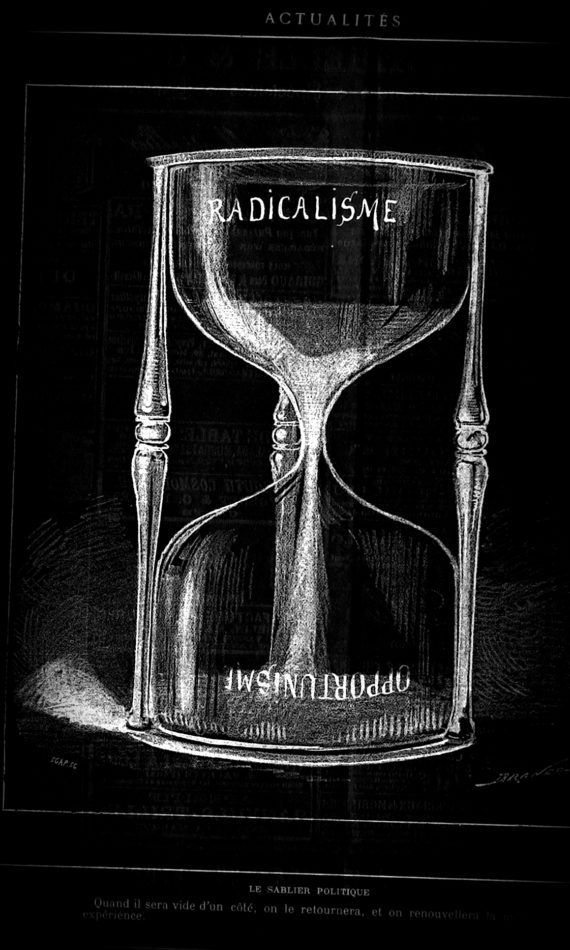
“L’éternité, c’est long … surtout vers la fin.” ― Franz Kafka We should count time by heart-throbs. He most lives,Who thinks most, feels noblest, acts the best PHILIP JAMES BAILEY, Festus Radicalisme – Opportunism Radicalisme – Opportunism Vintage Hourglass Advertising on MHC virtual museum Typo 1886 Hourglass 106 Le Sablier Politique Le Sablier Politique MHC Virtual Museum My…
Hourglass figure #101
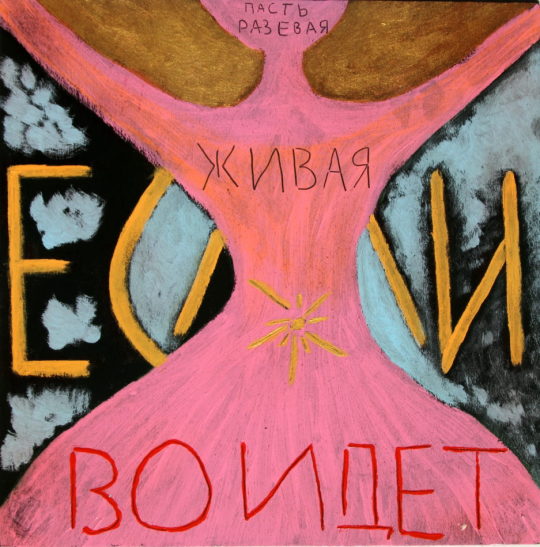
“When you are measuring life, you are not living it.” ― Mitch Albom, The Time Keeper Hourglass #101 – Hourglass figure Masonic Hourglass – a symbol of the third Degree of Freemasonry peculiar to the American Rite The Hourglass, Hourglass History Hourglass – measurement device Masonic Hourglass An hourglass (or sandglass, sand timer, or sand clock) is a device used to measure the intervals of…
Hourglass and Skeleton
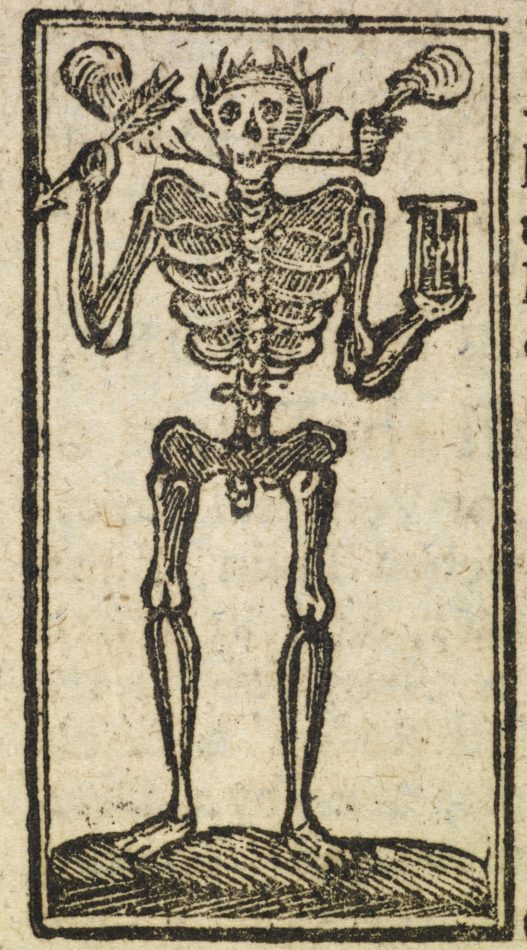
“This life therefore is not righteousness, but growth in righteousness, not health, but healing, not being but becoming, not rest but exercise. We are not yet what we shall be, but we are growing toward it, the process is not yet finished, but it is going on, this is not the end, but it is…
Hourglass symbolism
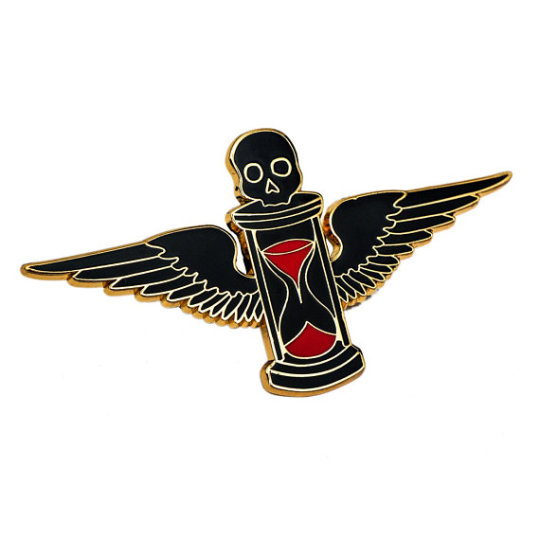
“The role played by time at the beginning of the universe is, I believe, the final key to removing the need for a Grand Designer, and revealing how the universe created itself. … Time itself must come to a stop. You can’t get to a time before the big bang, because there was no time…
Hourglass – symbol of Death
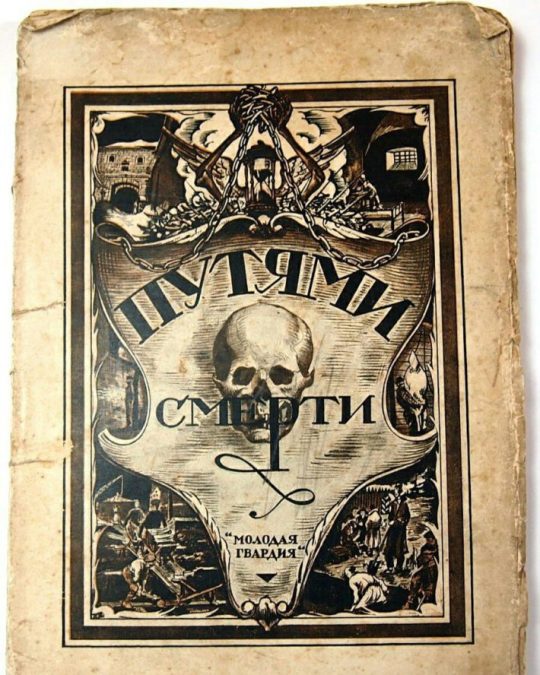
“A man is the sum of his misfortunes. One day you’d think misfortune would get tired but then time is your misfortune” ― William Faulkner, The Sound and the Fury Hourglass – symbol of Death The hourglass concretely represents the present as being between the past and the future, and this has made it an enduring symbol…
Hourglass posters
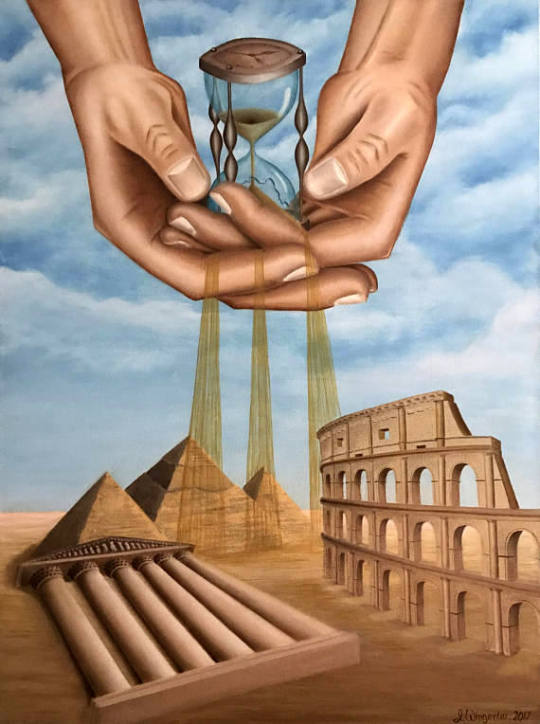
Your time is limited, so don’t waste it living someone else’s life. STEVE JOBS, Commencement address at Stanford University, June 12, 2005 Hourglass posters, sandglass prints The Hourglass, Hourglass History Hourglass – measurement device An hourglass (or sandglass, sand timer, or sand clock) is a device used to measure the intervals of time. It comprises two glass bulbs connected vertically by…
Hourglasses 25 and 26
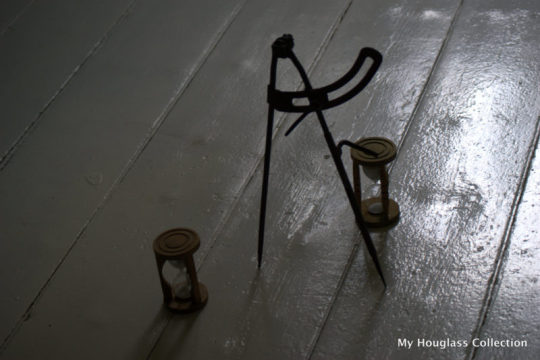
Time can’t be measured in days the way money is measured in pesos and centavos, because all pesos are equal, while every day, perhaps every hour, is different. JORGE LUIS BORGES, Brodie’s Report Hourglasses 25 and 26 Wooden hourglasses Masonic hourglass MHC – My Hourglass Collection MHC Virtual Museum – virtual museum about Time, Space and Magic…
Hourglass 197 micro gold

I think we are what Time may make us–lordsOf wealth and land, or wagemen held at hire;Turning the years, we gain our toil’s desire,Or lose, inopportune, its high rewards. KENNETH RAND, “To the Time-God” Hourglass 197 micro gold The immortal part of man “never, never, never, dies.” “Time, patience and persever-ance will accomplish all things.”…
Estepa, #143

“Everyday is a bank account, and time is our currency. No one is rich, no one is poor, we’ve got 24 hours each.” ― Christopher Rice Estepa by Rustam Adyukov – Art Director of MHC Virtual Museum Estepa description by mail [email protected] Hourglass Figure Sophia Loren by Adam Pierce Dynamic Vision Board Structure by Adam Pierce,…
My Hourglass Collection Qumran

Killing time is not an easy job. HARUKI MURAKAMI, Dance, Dance, Dance The Biointernet Expedition, Qumran, Israel Hourglass Sets: Hourglass Magic Cards Series Hourglass matchboxes set KRTK Series set Hourglasses on the beach set Hourglass wooden set Hourglass Toy Set Swarovski GOLD Memories Hourglass Post Stamps set Hourglass Posters Information about Hourglass: Hourglass Tattoo Hourglass Body…
Hourglass 34
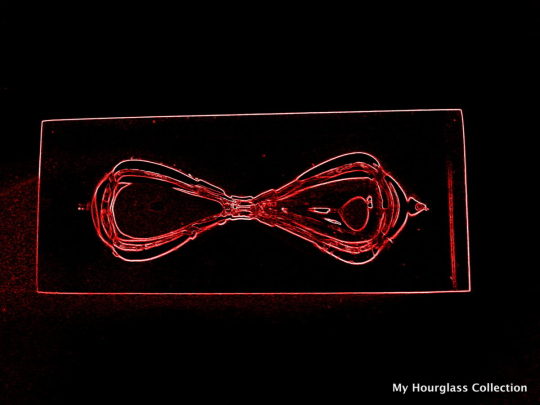
How very near us stand the two vast gulfs of time, the past and the future, in which all things disappear. MARCUS AURELIUS, Meditations Hourglass 34 Acrylic hourglass Hourglass Sets: Hourglass Magic Cards Series Hourglass matchboxes set KRTK Series set Hourglasses on the beach set Hourglass wooden set Hourglass Toy Set Swarovski GOLD Memories Hourglass Post…
Hourglass 30
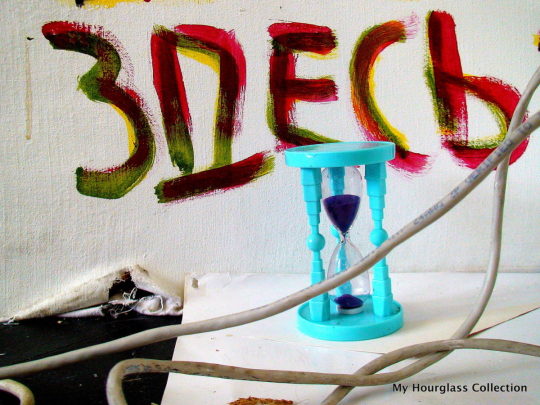
“Eventually, all things merge into one, and a river runs through it. The river was cut by the world’s great flood and runs over rocks from the basement of time. On some of the rocks are timeless raindrops. Under the rocks are the words, and some of the words are theirs. I am haunted by waters.” ― Norman…
Hourglass 8
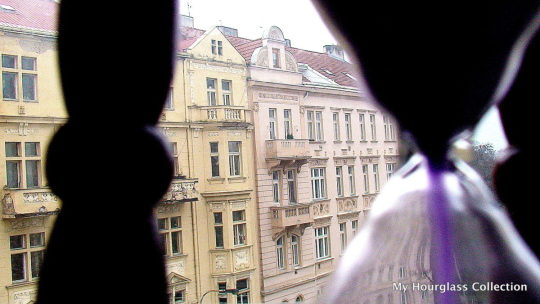
As you read this sentence, you probably think that this moment–right now–is what is happening. The present moment feels special. It is real. However much you may remember the past or anticipate the future, you life in the present. Of course, the moment during which you read that sentence is no longer happening. This one…
The Hourglass Figure

The Hourglass Figure is one of four female body shapes Hourglass body shapes have a wide bust, a narrow waist, and wide hips with a similar measurement to that of the bust About Hourglass Figure: Hourglass Figure Celebrities on MHC Hourglass Figure Marilyn Monroe MHC hourglass figure workout Hourglass body measurements – body shape online
Hourglass on Flag

Time — that black and narrow isthmus between two eternities. CHARLES CALEB COLTON, attributed, Dictionary of Burning Words of Brilliant Writers The first thing necessary for a constructive dealing with time is to learn to live in the reality of the present moment. For psychologically speaking, this present moment is all we have. ROLLO MAY, Man’s Search…
Hourglass 121 Swarovski

But all the while I sit and thinkof times there were before,I listen for returning feetand voices at the door. J. R. R. TOLKIEN, The Fellowship of the Ring Hourglass 121, micro, Swarovski Swarovski Crystal Memories Classics Hourglass Hourglass 121, micro, Swarovski Dimensions 25 mm High 18k gold plated This retired Swarovski Crystal Memories hourglass is…
Hourglass - Masonic Symbol Exhibition
Hourglass with Wings - Masonic Symbol
Masonic Hourglass – a symbol of the third Degree of Freemasonry peculiar to the American Rite.
Hourglass 267, masonic hourglass wings
Hourglass Collection Website: https://hourglasscollection.org
Read the full article
0 notes
Text
Dis Kpop rant bout to be real unappealing to most of my followers lol
But bear with me, y’all. If I go long, I’ll make a jump.
Y’all, I’m old. Okay? Like, let me tell you how old. I’ve been a K-pop stan for 10 years, no exaggeration. Literally, my first introduction to K-pop was one of my friends when I was a teenager sending me a BoA song because he thought I’d like her. This was literally 2007 (or maybe even 2006??? IDK) I have my biases from over the years, but also, I know pretty much who were the hottest groups/solo artists at the time. Like, when time passes and you get a little more removed from your biases, you can report honestly (I also just so happened to stan a couple of the hottest, but that’s par for the course. They’re the hottest for reasons.)
So, literally, when I see newer K-pop fans say artists like BIGBANG, EXO, Super Junior, and SHINee were irrelevant, or are currently, I get a little dumbfounded. Literally at some point, or even now, these were the hottest boybands in Korea. Many of them, in much of Asia.
Wait, let me clear one thing up. I’m K-pop Rip Van Winkle. That’s a story about a man who falls asleep for a very long time, and wakes up to a very different world. So, my long sleep was college. For a while, while I was in college, I stanned K-pop hard, still. I even went to concerts when I had time off from classes, traded photocards with friends, downloaded songs on iTunes... Then, school got more serious when I started in my major. I had almost no free time outside of it (theatre major = death lol), and so I stanned online very little. I still sometimes watched YouTube videos or downloaded songs I liked, but my fandom became very casual. And y’all, this is a big deal for me. I mean, I was THAT fangirl. I had all the merch, spammed all the comments sections, wrote all the fanfiction, saved money so I could fly across the country to go to concerts, ran stan twitters and tumblrs, like, I was an all-in fan. By somewhere around 2014/15, I had no choice but to chill on that. It was either that, or, like, not have perfect grades, and perfect grades were my LIFE. No joke.
So, in December of 2016, I graduated from college (university, for non-Americans), and I was ECSTATIC, and I’ve been doing well, having been accepted to grad school and done all this fun shit. So, of course, I went back to stanning. But, yenno, I just went back to stanning Marvel hard online, at first. (Did I mention Marvel? Yeah, I was a k-pop and Marvel fangirl, lol. Real man-catching shit. It’s why they’re always in my DMs, amirite?) Occasionally, I’d check back in with K-pop when something cool happened with a group I loved. Or something fuckING SAD AS FUCK, like 2NE1 FUCKING DISBANDING WTF YG???
But I noticed something. This newer group that I sorta liked when I checked out of K-pop standom had blown up. But, with their newfound fame and success came a new, horrible group of stans. Y’all might get mad, I remember Kpop savagery... but that group is BTS.
Don’t get me wrong. K-pop been like this. Fanwars are like... ubiquitous with K-pop. It’s really funny, when you’ve been far removed from K-pop for a prolonged period of time. Like, the rose-colored glasses come off and you see the shit for what it is, and it’s just dumb as fuck. Like, everyone who isn’t a k-pop stan thinks k-pop is dumb as fuck, or either irrelevant, and everyone who is a k-pop stan thinks all other k-pop is dumb as fuck or irrelevant other than who they stan. It’s counter-productive, crab-in-a-barrel shit.
And like, I’ve been heavy in black tumblr/twitter during my K-hiatus, too, and like, I’m so used to the positivity shit, like supporting other black women/woc and supporting black-owned business and also feminist twitter/tumblr, like sisterhood and supporting and uplifting each other. So, seeing people essentially on the same team literally tearing each other down and saying how lame/ugly/untalented/irrelevant/whatever the fuck the other thing is, it’s like jarring AF now.
(Also, K-pop... itself, and often the fandom, it’s just toxic in many ways. Racially... like, the weird racial shit still happens in 2017, and many kpop fans write that shit off. Also, with queer shit, like... the weird, fetishy way people act about queerness vs the straight up homophobic way people react to the idea of legitimate queerness in kpop, and like... lot’s of shit, but that’s a topic for another rant.)
But anyway, BTS stans. Listen, I liked BTS back in like 2014 or whatever, right before I checked out, for school. At the time, they were relatively new (rookies, even), and they had a growing fandom, but yenno, that’s normal for pretty much every newer idol group. My point is: I thought BTS were cool. That “American Hustle Life” or whatever it was was fun to watch, if mildly problematic, but eh, everything hip-hop in Korea is mildly problematic.
So, when I came back and saw them thriving, I was kinda happy. I knew they had increasing fans (many of my classmates who liked K-pop liked BTS, among other groups... often including the earlier ones I mentioned, and then shit like Monsta X and Ikon.), but I had no idea they were like... competitive with EXO until I really had this free time to stan again.
Going long, so it’s under a cut, if you GAF. I write a lot (I’m literally a writer, and writing a lot is beautiful, ask Alexander Hamilton, ask Leo Tolstoy, ask ya mama).
But then the Armys. Mostly on twitter, like, I don’t really see y’all on tumblr. I don’t follow a ton of K-pop twitters, on this blog. (I have an old stan tumblr that I sorta forgot the password to, so IDK.)
IDK, like I said, I’m old. So maybe this is a teenager thing? But there’s this obsession with calling everyone, literally every idol group outside of BTS, irrelevant.
Also, there’s this obsession with believing BTS is the only idol group to make it alone (going platinum with no features!) or, basically, without a Big 3 label to back them. OR, that none of the other idol groups struggled to gain their positions.
Both things are silly, and to me, say you’re not a k-pop fan. Which is fine. I “wasn’t a k-pop fan” for probably the last two years. I was pretty much just watching for 2NE1 updates, or BIGBANG news via alerts on my phone, and whatnot.
But, if you are a K-pop fan, and you consider yourself a K-pop fan (like I was, pre-2015), you ought to really know better. I consider myself a bit of a k-pop historian. No, seriously, my concentration in college was pretty much performance studies/dramaturgy; which if you know what that means, it means I’m the nerd that wants to know how performers in Renaissance Italy got costumes, and what connection the play Hamlet has to Shakespeare’s relationship with his own son, Hamnet. So, when I obsessed over K-pop, I literally STUDIED it. Like, I read actual books and journal articles about hallyu, that’s the kind of nerd I am. So, here it what I know that I know about K-pop.
You do have idol groups who benefited from the level of fame their Big 3 label gave them, and especially the big idol groups that label had before them (that’s kinda... Ikon, Winner, EXO... not that they didn’t have their own journeys, but the BIGBANG, Suju/SHINee bump really benefited those groups.)
But then you have BIGBANG, and Block B. BIGBANG is a group that literally started out flopping. They began in a time when YG was a hip-hop label, and the idea of them putting out an idol group was laughable. The most similar thing YG had at the time was 1Tym, and that wasn’t an idol group, but a hip-hop group. BIGBANG was an experiment, for Yang Hyun Suk. He wanted to bring a different flavor to idol groups, who at the time, were essentially Korean versions of the Backstreet Boys. Mind you, this was around 2005, when the decision was made. So, he took his kid rappers G-Dragon and Taeyang, and his kid singer Daesung, and he brought in underground rapper T.O.P, former SM trainee/reality TV contestant Seungri, and another kid he had as a trainee, Hyunseung. Some of them were not happy that they were going to be in an idol group, as they had joined YG because it was a hip-hop label and they wanted to be rappers. (Yes, Taeyang was a rapper. He became the main singer of the group because Teddy and them thought he had a nice singing voice. Mind you, they were still very young, at this time.) Hyunseung actually got cut, and eventually went on to be a Troublemaker (lol).
BIGBANG debuted to mix reviews. They were weird, ugly (compared to other idols), and people didn’t really get them. They had some fans, but again, that’s not what idol groups were. Idol groups were, well, TVXQ.
Then, G-Dragon happened. YG let GD play around with music a lot, and he wrote these two songs. YG liked them, so he told GD that BIGBANG would record them. GD wasn’t happy about that, either. He thought they’d be his solos. But, it was still a big opportunity for a kid his age to get their songs produced (again, at THIS time, idols did not write their own songs. Idols barely had autonomy at all, back then. These days, a lot of idols write songs.)
Those songs were “Lies” and “Haru Haru”. Both were smash hits. I’m talking, burn up the charts, blow up, K-pop-will-never-be-the-same hits.
Let me remind you, I was actually a k-pop fan, by then. I literally remember the shift. I was stanning Rain, at the time, because he was different than all the other idols.... who were still mostly doing cutesy shit, and a lot of ballad.
When BIGBANG blew up (I wasn’t their fan, yet), other companies followed suit, and started changing up their boyband format. The first was probably 2PM (I DID stan them... because, yenno, Rain was JYP, and so were 2PM.). That sorta hip-hop slant to k-pop groups, it was added largely because BIGBANG changed the game. Don’t get me wrong, those guys were already JYP trainees, for the most part (Jay Park was actually a JYP trainee at the same time that GD and Taeyang were YG trainees; y’all probably know the story about YG and JYP planning to make them a trio.) But, I still say most of the hip-hop style in k-pop, specifically, came from BIGBANG. Obviously, there were already hip-hop groups, but they were hip-hop, and the genre wasn’t really crossing with K-pop in a significant way.
Yadda yadda, Heartbreaker, Alive, GD&TOP, the rest is history, IDK.
Now, Block B. My in-depth knowledge of them isn’t as great, but I know their story.
Block B was another project-group. Cho PD, also, wanted to make a hip-hop idol group. But his idea, I guess, was to go more of a pure hip-hop direction than BIGBANG. (As you probably know, BIGBANG are genre chameleons, while Block B lean much more heavily hip-hop than BIGBANG. This isn’t commenting on anyone’s ability. Block B can cross genres well, and the hip-hop members of BIGBANG do it well, too.)
So, Block B comes out, and you know, they have kind of a smash debut (not on like a MONSTER ROOKIES level, but they did damn good.) But also, immediately, they have controversy... mostly over dumb shit like “you copied BIGBANG!” (Which is also really funny, because Cho PD and Yang Goon actually had beef of some sort. Which also made it awkward, because Block B members actively tried not to mention BIGBANG, even though several of them like BIGBANG. And I think vice versa.)
But, Block B can’t be held down. Like, no. Seriously. So, the thrived, until the fire nation attacked. There was controversy over statements made, over their song contents, all this shit. It seemed like Block B was going to end before they started, which was tragic because there’s a lot of talent there, and nobody wanted to lose them.
Then, just as things started to look up, again, Block B had had enough with their label, Brand New Stardom (or just Stardom). They straight up weren’t getting paid. They were literally hungry, having to scrounge or ask their parents for food, transportation, etc. It was a mess. So, eventually, they left Stardom, and the CEO committed suicide. It got really ugly.
It really, again, seemed like Block B might be over before they even started. Which was a shame, because honestly Zico. Zico was a talent that didn’t need to be wasted (this is not shade to the other members, but seriously. Zico was their GD, he’s the Zion.T, he’s the Tablo, and if you’re a kpop fan, you SHOULD know what that means, and what kind of musician he is.)
But again. Block B can’t be held down. They rose, once again. Triumphantly. They came out with “Very Good”, which, like, GOT THEM ON BILLBOARD, and one them their first music show award, and like, blew them up.
And I don’t think you guys understand how much we all cried when “Be The Light” came out.
And, yenno, lot’s of good things, the rest is history, yadda yadda.
These are just two stories, but yea, no, BTS isn’t the first, or last, to claw their way up from nothing, from obscurity, from relative doom. (I didn’t even talk about all the career-ending scandals that both of these groups had, that they survived and overcame. Seriously, BIGBANG almost legitimately ended in 2011. Why do you think they came out with ALIVE in 2012?)
“But, random old-head kpop fan,” you might be thinking, “nobody did for hallyu what MY BIAS-”
but let me stop you right there, see, because that’s cRAZY, to me. Hallyu been poppin since, like, IDK 2002 or 2003.
Like, who are the Hallyu Kings? DBSK/TVXQ. That’s just Kpop 101. They are practically the reason for Hallyu.
Let me give you some major Hallyu players from the past, eh, 15 or so years. DBSK, HOT, Rain, Se7en, BoA, Super Junior, SNSD/Girl’s Generation, Wonder Girls, BIGBANG, 2NE1, SHINee, EXO. Are there other realllly popular idol groups? Sure. Infinite, VIXX, BAP, f(x), just to name a few. But if you really get down to it, who was leading Hallyu all those years? These are the major players. These are the people whose music, style, popularity, made the world look at K-pop. I PROMISE you. I mean, look up Stephen Colbert’s rivalry with Rain. Look up Cassies record in Guinness for largest fan club in the world. Look up BoA’s dance chart topping US debut. Look up these people’s fame in Japan. In China. In South America. These names WERE k-pop, some still are. (Big daddy Rain/Bi has Hollywood movies, for fucks sake. Don’t you talk to me about Hallyu!)
“But, old lady,” you say to me, “I never heard of them, then!”
I know. And plenty of people, today, haven’t heard of K-pop, outside of Korea and regions where the idols are mainstream. But, yeah, the fact that a lil black girl in North Carolina in 2007 could be listening to BoA, before we had stan twitter and tumblr and YouTube was a baby that only had random uploads and when all my k-pop updates had to come from forums.... that just further proves that hallyu was already a thing. Also, my dear, I bet you’re a LOT younger than me. You could’ve been, like, 5, in 2007. I was in high school. I’m in my mid-20s, many of you are teenagers. That’s also really lovely. I love that K-pop is continuing through the generations, and didn’t burn out as a fad (which is what people have been saying ever since I bought my first Rain album.)
So, what I’m saying is... even if it’s uncomfortable for you to admit... your faves, whether that’s BTS, or Monsta X, or Ikon, or Black Pink, or whatever, ABSOLUTELY owe their success to the HUGE Hallyu strides made by: DBSK, HOT, Rain, Se7en, BoA, Super Junior, SNSD, Wonder Girls, BIGBANG, 2NE1, SHINee, and EXO. THERE WOULD NOT BE ACCESS TO KPOP OUTSIDE OF KOREA if it wasn’t for OUR presence back then. Us, in the US and Canada, and Europe, and South America, who struggled in forums just to get morsels of BoA or Rain music, who tediously translated variety shows featuring BIGBANG and Suju before there were official uploads, who made our faves SO POPULAR that shit like KCON, allkpop, and soompi were created to give us better access to them, who made such a loud impact that companies started making official twitters and YouTube channels for their idols.
I literally watched ALL OF THAT unfold. It all unfolded before my eyes in the last 10 years. It’s INCREDIBLY RIDICULOUS to suggest that shit didn’t emerge because of hallyu; because hallyu was emerging. That’s why you were even able to FIND small idol groups that didn’t come from big companies. In 2007, if you were an idol group from a small company, you’d better pray you got good variety slots to garner interest. Now, it’s par for the course for them to easily connect with fans through shit like YouTube, Twitter, and Instagram (even shit like weibo, which isn’t Korean, but to reach other Asian fans.)
I’m not even going to get into skill, talent, and respect for position because of these things (because that’s a deeper convo, and look where we are already, son and daughter!)
Just... even if you never want to pick up a SHINee album, or watch a BIGBANG MV, let’s not resign ourselves to some foolish notion that every newer idol group owes not their very existence to these cats. This is not a commentary on talent, effort, or anything else. But realistically, you likely wouldn’t have even found them. They also may have never been formed (the influx of foreign fans also brought on an influx of new idol groups. That’s why there are literally hundreds of idol groups, now, versus when, say BIGBANG debuted. There’s so much pie, that everyone is jumping at the chance to get a slice. If there were only fans in Korea, new bands would still emerge, but way fewer, and less frequently.)
Also: it is entirely possible to stan your bias group AND acknowledge the impact that seniors had on them. Wanna see me do it? BIGBANG is my bias group, but they would NOT exist without 1Tym, or DBSK. DBSK is THE boy band model. Yes, there are earlier idol groups, and ones just as big (OMG I LEFT OUT SHINHWA, WHICH IS BLASPHEMY), but DBSK CHANGED the fucking GAME, for K-pop idol bands. They’re the blueprint. 1Tym is literally the styling for every hip-hop influence group in Korea (them and Epik High, but BIGBANG is more directly styled after 1Tym). Besides that, 1Tym is the band that bore Teddy Park, who gave BIGBANG much of their early sound, and to this day helps write many YG artists’ music. If 1TYM or DBSK had never existed, there’s a large chance BIGBANG never would’ve existed.
And, if DBSK didn’t blow up so hard, there’s a large chance BIGBANG would’ve never gotten as much international interest, especially in the early days. (The same could be said for their connection to 1Tym, who actually introduced them in the States at an early YG Concert.)
**small amendment: BIGBANG also owe a lot to Se7en, who was their big bro when they needed it most, and also fixed their names right on up. (I believe he named several members, and saved them from Yang Goon’s terrible naming. Seriously, TOP was gonna be Mark. Which is fine, if your name is Mark, but his name is Seunghyun, and YG just liked the name Mark for some reason. Se7en saved TOP’s life.)
So, can y’all soothe my old ass heart and at least pretend to understand the history of the genre you claim to love? Is that alright? Can that be a thing?
No? Y’all hate me, now? Okay...
Till next time, K-poppers!
#aka the history of korean entertainment as told by raven#bigbang#bts#exo#shinee#super junior#monsta x#black pink#2ne1#dbsk#idk i mentioned a lot of y'all faves#is this a can of worms?#or did i just save kpop?#just call me raesus#alright read this long ass shit or move on#one rule#DO NOT REPLY IF YOU DID NOT READ TO COMPLETION#mostly because i hate repeating myself
3 notes
·
View notes
Text
A tutor’s guide to lit reviews
A while back I did a post on writing a basic academic analysis essay, prompted by repeated issues I’d seen during my work as a tutor. Based on similar concerns I’ve seen regarding other common writing projects, I’ve decided to expand this into a series. Today I’m going to tackle literature reviews.
I would like to emphasize right off the bat that all this advice is based on my experience both as a tutor and student with a humanities and social sciences background. Take what is useful to you, leave the rest, and definitely listen to your instructor over me.
First of all, what is a literature review? It’s a review of the literature – taking a look at what scholars have written about a certain topic. Literature reviews are often written before or as a component of a research paper. You want to know what other people are saying about a subject before you jump in yourself. What has been covered exhaustively? What is relatively agreed upon? What is disputed? What gaps exist – areas or angles that no one has yet investigated adequately? A literature review can help guide your own research by showing you which areas are worth probing into. When you write it, depending on exactly what your instructor is asking and whether the lit review is part of a longer paper, you may simply focus on the findings of these other scholars or do some more analysis work (what conclusions can you draw? What limitations do you notice?) Overall, it is less about making an original argument than about identifying trends or conclusions made by others, and your thesis will reflect that. Now, if the lit rev is part of a bigger research paper, your thesis will of course have to do with the research you are conducting.
Doing the Research
Before you start writing a lit review, you’ll need to gather the research you’re going to talk about. If you’re doing a big project like a dissertation, you might exhaustively track down everything you can find. If you’re writing a smaller paper, you’ll probably be less ambitious, especially if your topic is broad. (Imagine reading every article on Hamlet!) Try to make your topic as narrow as you can, first of all. Then prioritize articles that are current (especially if you are in a field that values currency such as STEM fields) and/or highly regarded. “Important” articles can often be identified by keeping an eye out for important researchers’ names and noting how often articles have been cited. Some databases like Web of Science will show you who is citing what, and Google Scholar is moving in that direction. More citations reflect an article that is making waves and probably worth looking at.
Once you have a good selection of articles, read through them. You may decide some don’t fit and discard them. Once you have a set you want to work with, identify their main arguments and points. That’s what your literature review will discuss.
Organization
A common mistake when writing a lit review is to organize it by source. The first body paragraph describes article #1, the second paragraph describes article #2, etc. Instead, the best way to organize a lit review is by concept. You're putting different scholars into conversation with each other. (Academia is a conversation – albeit often a very insular one.) What do most of the scholars seem to agree on? What areas do they disagree on?
As you're doing this, as I said earlier, you may be identifying gaps in the literature. What haven't people talked about? What might they be overlooking or not interpreting right?
Anatomy of a Lit Review
If you’re writing a bigger paper, the lit review will probably be a small portion wedged between your introduction and methodology. This post is mainly designed to help people writing a lit review that stands alone and requires its own introduction and conclusion.
Introduction
Your intro will start out by identifying your subject and justifying why it's important. Why focus on this? It will also identify any major trends you noticed in the literature and major conclusions you can draw (your thesis). If there are any terms or concepts that might be unfamiliar, outline them here, especially if you’re using terms in a way that might not be universal. You should also be clear about your scope – which portions of the subject are you concerned about (ex: caffeine use in young middle-class adults from 18-25). Here’s an example I did for a lit review on ebooks.
The rise of technology in libraries has allowed electronic or e-books – “digital objects specifically designed to be accessible online and read on either a handheld device or a personal computer” – to become a major part of the text-based world (Bailey, Scott, and Best 7). Authors have the opportunity to self-publish their work, students can read assigned chapters on their phones, and librarians can stock texts without having to make room on the shelves. According to the Huffington Post, four out of five publishers now regularly publish e-books (Bailey, Scott, and Best 6). Certainly, e-books are not going away. Instead, they are a growing phenomenon and one that librarians must consider carefully. Librarians face many issues when considering how much to supplement or replace their collections with e-books. Some problems are universal, while others vary between types of books and libraries. For the purpose of this paper, academic libraries and academic e-books will be considered.
I’ve defined ebooks (although there are some obvious holes in that definition), emphasized that they’re worth considering with some statistics, and identified the scope of my paper (academic libraries and e-books). The second paragraph of my introduction goes on to explain why this is important:
The use of electronic books is a major concern for modern academic libraries and so is an area worth thorough investigation. Newer generations of students are digital natives, accustomed to being able to access information on the go. Being able to read text on their computers and screens is something they take for granted. On the professional side, pricing and space are constant issues. […] E-books both help and hinder library interests. As the digital world continues to grow, libraries must decide how to adapt. Considering e-books is part of that response. Matters of practicality and user preferences both play a part in that decision-making process. […] Taking everything into consideration, research suggests that academic librarians ought to pursue a hybridized strategy keyed to their particular situation. While this may appear non-committal, the tactic aids libraries in serving patrons to the best of their ability.
Here, I have both justified my topic and laid out a blueprint for my literature review. What are my main topics and themes? I am going to be looking at pricing, space, practicality, and user preferences. Based on the research I looked at, I’ve drawn a conclusion.
Body Paragraphs
As I mentioned earlier, body paragraphs should be structured by idea rather than article. The topic sentence rule I talked about in the last essay post still holds true – start each paragraph with a topic sentence describing the paragraph’s focus. Ex:
Topic Sentence: The impact of e-books on access is a complicated issue. First main point: At first glance, e-books are much more accessible than print. They can be read anywhere at any time and do not need to be carted around. Many students cite accessibility as e-books' main advantage. Supporting details from various sources: In a survey done by Gilbert and Fister, "ease of access" is the top reason students say they might use e-books (474). […] Second main point (counterpoint, putting sources in conflict): However, in some ways e-books are very inaccessible. Some individuals with disabilities might have difficulty reading electronically, even while others may find it helpful to be able to zoom in on text, change its font, or manipulate it in other ways. […] Conclusion: E-book accessibility is not as simple as logging in. While the ability for a student to read an e-book in their dorm room is a draw, it becomes less of one if the screen gives them headaches or they cannot open the book on their personal e-reader.
Discussion/Conclusion
If you’re writing a standalone lit review, hopefully throughout the body paragraphs you have been looking at themes and ideas shown in the literature. However, you might take some time in a separate discussion portion to contemplate the ramifications and draw some conclusions or make recommendations.
But wait! We’re not quite done.
Recommendations for Further Research
Scholars love identifying areas for further research. It justifies their existence. Based on what you see here, what should be investigated next? What gaps need to be filled? Are events developing so quickly this will all need to be revisited? Do you see any big changes on the horizon? If your lit rev is part of a bigger paper, you are probably going to identify a gap that you’re about to fill! Ex:
E-books, like all other parts of the digital world, are a topic that should be continually checked as attitudes and technology change. […]
An area where e-books may outpace their print counterparts is where they can stretch the medium. […] Further research into more cutting edge e-books and user response could suggest whether this is a field where e-books can gain some popularity, or whether they will continue to be seen as a distraction from the words on the page.
This site is a good guide to reference. Looking at actual literature reviews is also a good way to get used to writing them. Some databases allow you to search for them specifically. If there isn’t that option, searching with ‘review’ as a keyword or in the title field will often net you a few. Also, just google sample literature reviews!
Again, remember this is all my perspective. I encourage you to seek as many as possible to figure out what works for you. And always follow your instructor’s recommendations.
7 notes
·
View notes